

CBRE group, inc. Investor Overview June 2019 Exhibit 99.1
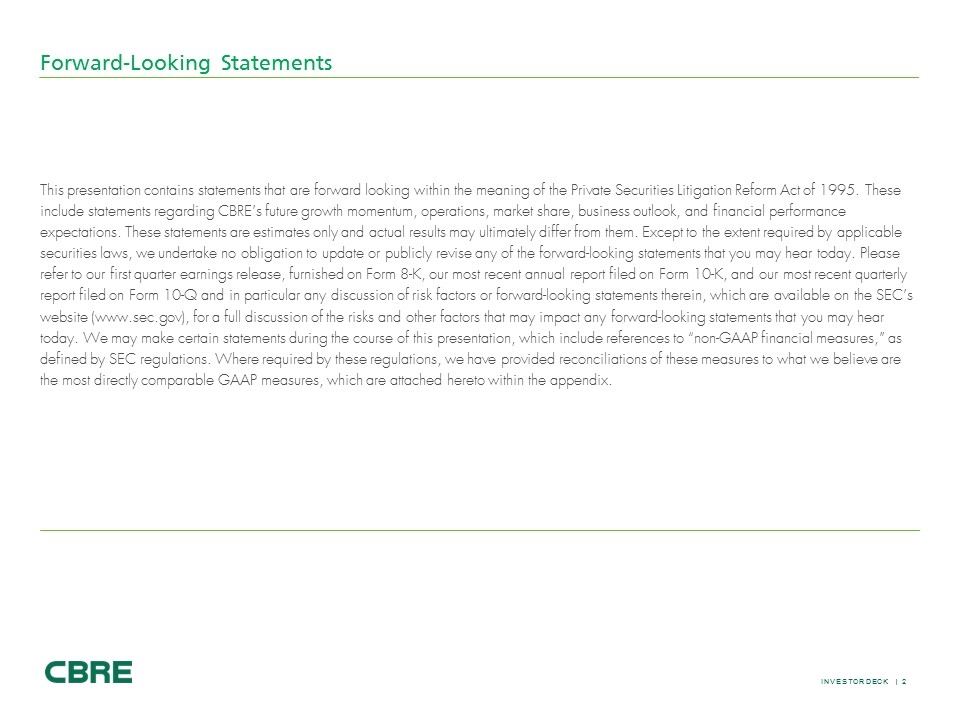
This presentation contains statements that are forward looking within the meaning of the Private Securities Litigation Reform Act of 1995. These include statements regarding CBRE’s future growth momentum, operations, market share, business outlook, and financial performance expectations. These statements are estimates only and actual results may ultimately differ from them. Except to the extent required by applicable securities laws, we undertake no obligation to update or publicly revise any of the forward-looking statements that you may hear today. Please refer to our first quarter earnings release, furnished on Form 8-K, our most recent annual report filed on Form 10-K, and our most recent quarterly report filed on Form 10-Q and in particular any discussion of risk factors or forward-looking statements therein, which are available on the SEC’s website (www.sec.gov), for a full discussion of the risks and other factors that may impact any forward-looking statements that you may hear today. We may make certain statements during the course of this presentation, which include references to “non-GAAP financial measures,” as defined by SEC regulations. Where required by these regulations, we have provided reconciliations of these measures to what we believe are the most directly comparable GAAP measures, which are attached hereto within the appendix. Forward-Looking Statements
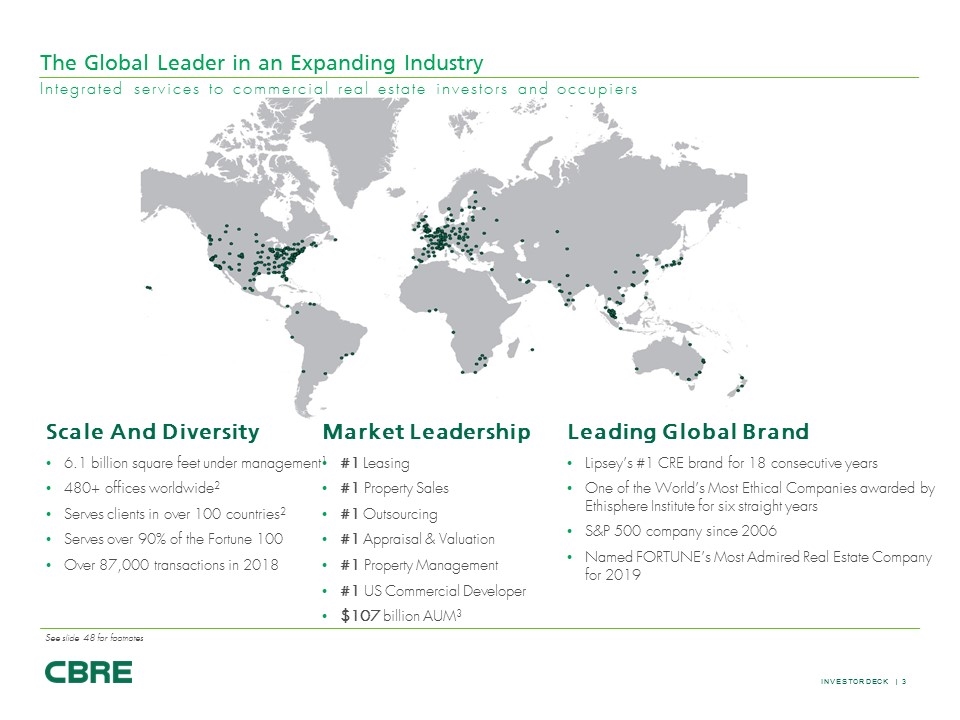
Market Leadership #1 Leasing #1 Property Sales #1 Outsourcing #1 Appraisal & Valuation #1 Property Management #1 US Commercial Developer $107 billion AUM3 Scale And Diversity 6.1 billion square feet under management1 480+ offices worldwide2 Serves clients in over 100 countries2 Serves over 90% of the Fortune 100 Over 87,000 transactions in 2018 The Global Leader in an Expanding Industry Integrated services to commercial real estate investors and occupiers Leading Global Brand Lipsey’s #1 CRE brand for 18 consecutive years One of the World’s Most Ethical Companies awarded by Ethisphere Institute for six straight years S&P 500 company since 2006 Named FORTUNE’s Most Admired Real Estate Company for 2019 See slide 48 for footnotes
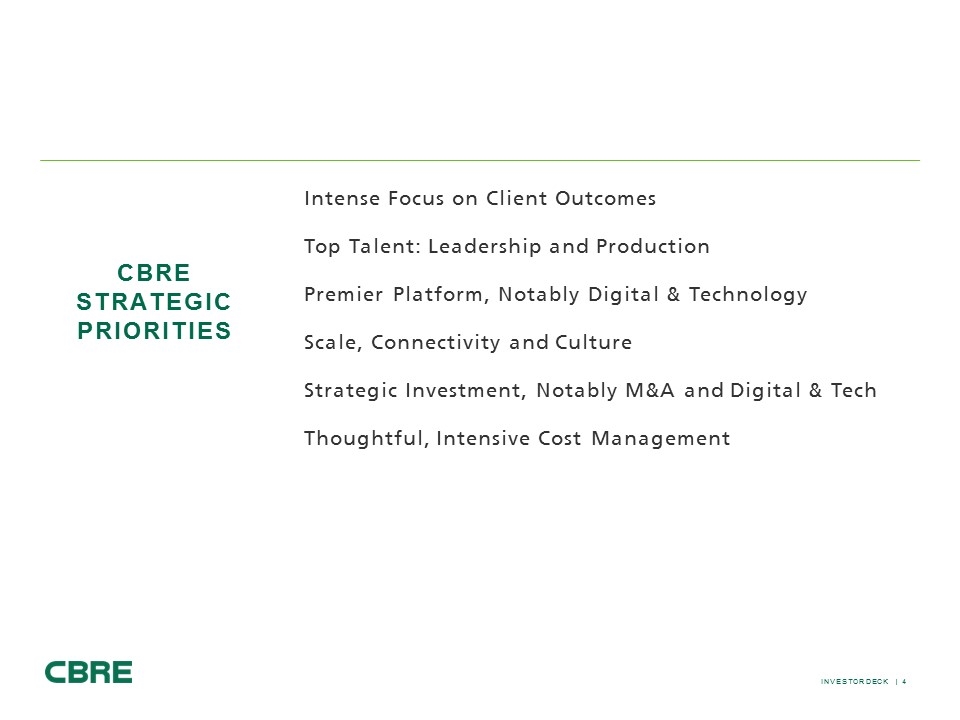
CBRE Strategic priorities Intense Focus on Client Outcomes Top Talent: Leadership and Production Premier Platform, Notably Digital & Technology Scale, Connectivity and Culture Strategic Investment, Notably M&A and Digital & Tech Thoughtful, Intensive Cost Management
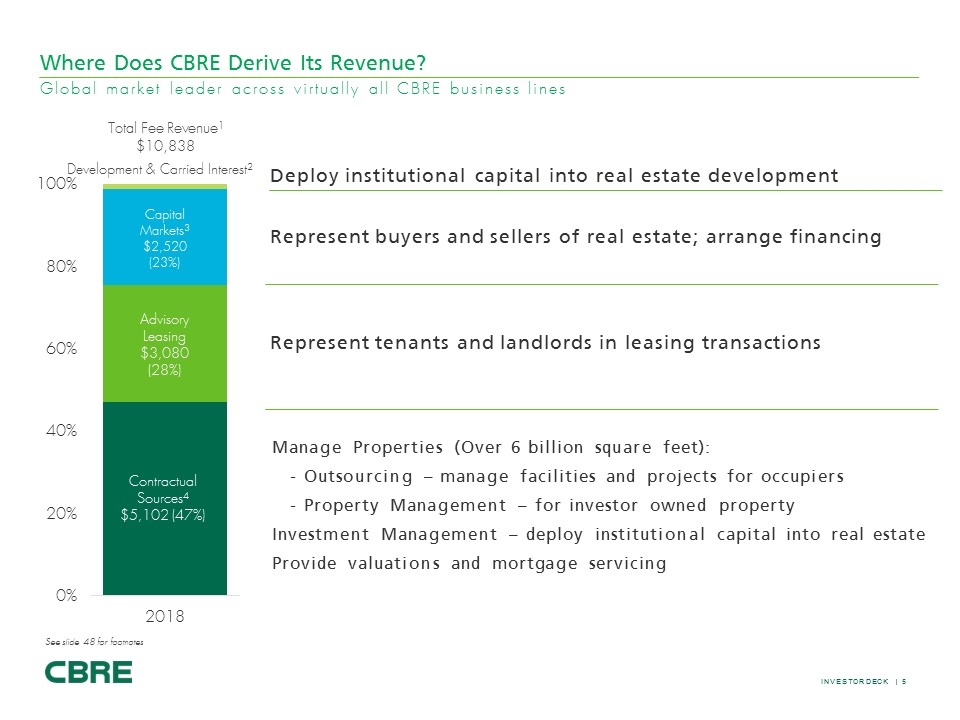
Where Does CBRE Derive Its Revenue? Global market leader across virtually all CBRE business lines Manage Properties (Over 6 billion square feet): - Outsourcing – manage facilities and projects for occupiers - Property Management – for investor owned property Investment Management – deploy institutional capital into real estate Provide valuations and mortgage servicing Deploy institutional capital into real estate development Represent buyers and sellers of real estate; arrange financing Represent tenants and landlords in leasing transactions Total Fee Revenue1 $10,838 Development & Carried Interest2 See slide 48 for footnotes
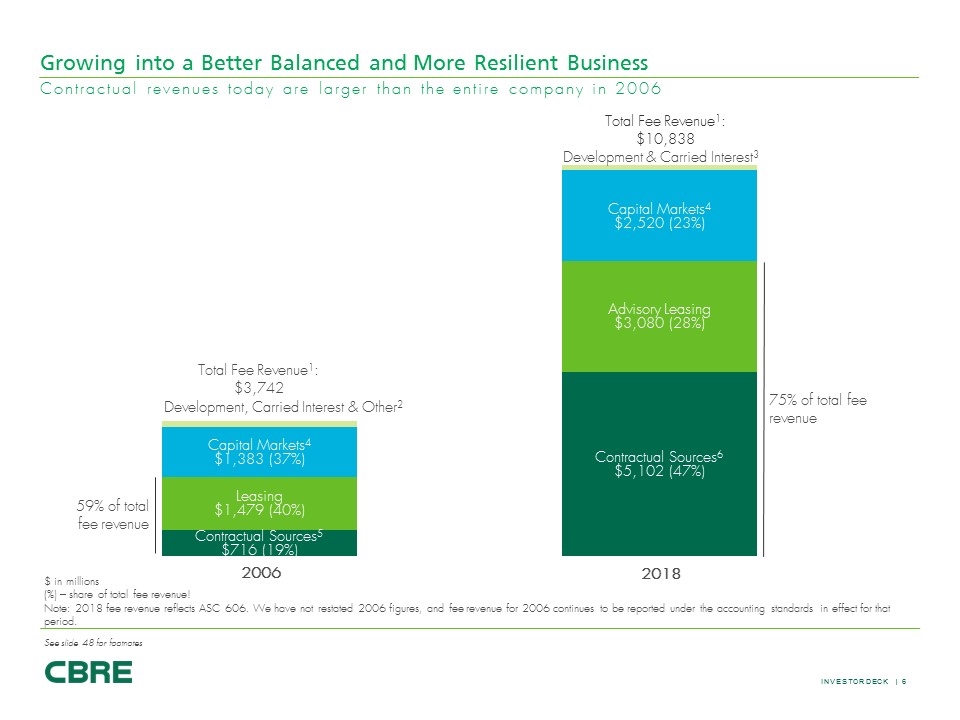
$ in millions (%) – share of total fee revenue! Note: 2018 fee revenue reflects ASC 606. We have not restated 2006 figures, and fee revenue for 2006 continues to be reported under the accounting standards in effect for that period. 75% of total fee revenue See slide 48 for footnotes Growing into a Better Balanced and More Resilient Business Contractual revenues today are larger than the entire company in 2006
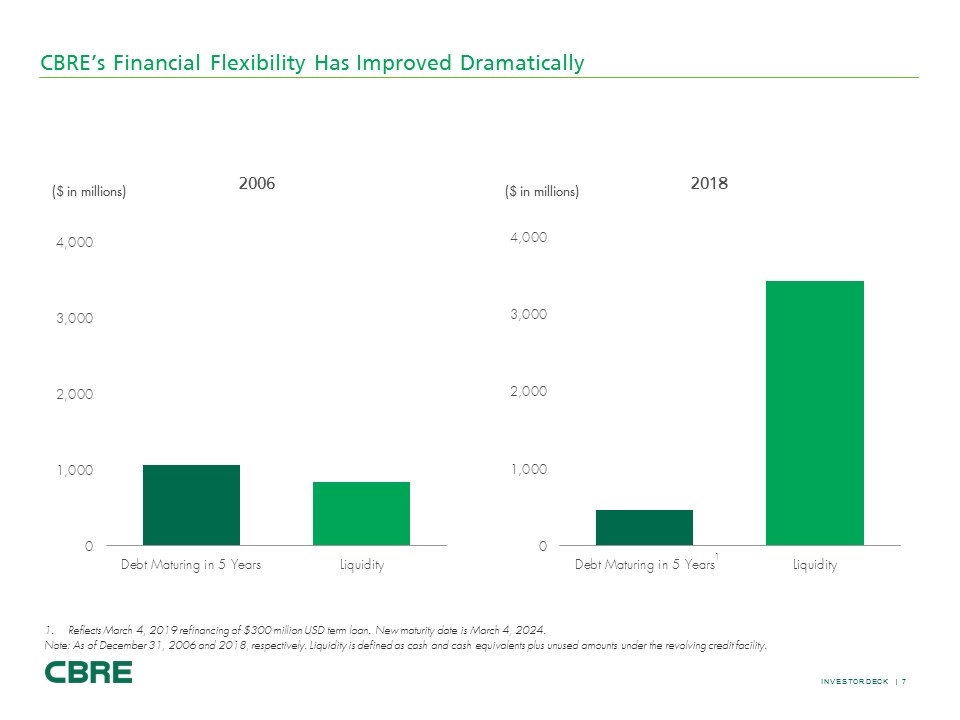
CBRE’s Financial Flexibility Has Improved Dramatically ($ in millions) ($ in millions) Note: As of December 31, 2006 and 2018, respectively. Liquidity is defined as cash and cash equivalents plus unused amounts under the revolving credit facility. 1 Reflects March 4, 2019 refinancing of $300 million USD term loan. New maturity date is March 4, 2024.
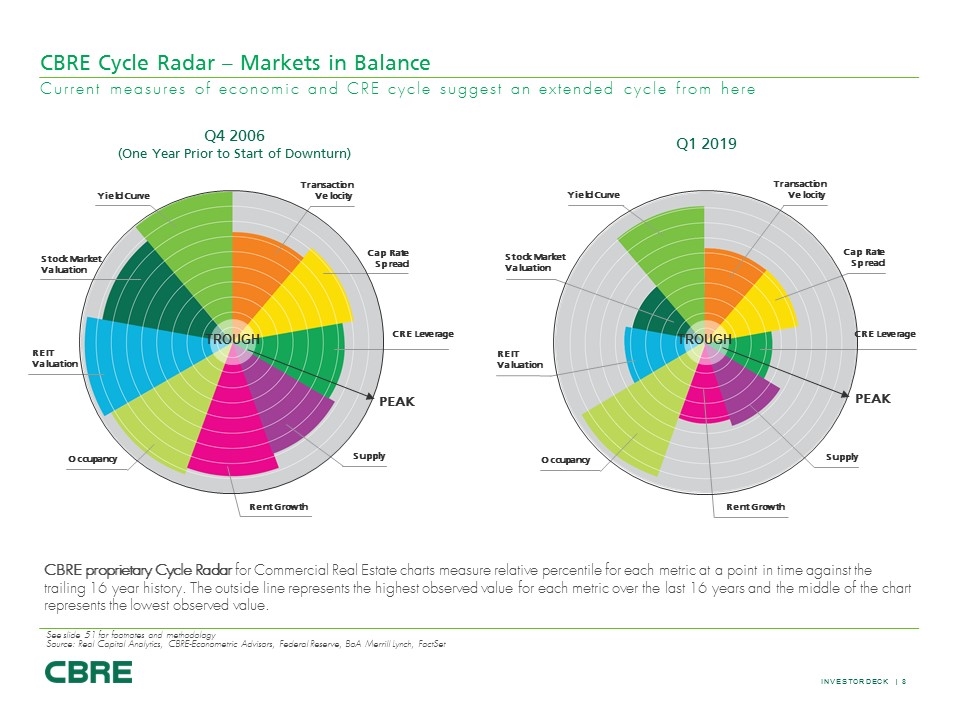
CBRE Cycle Radar – Markets in Balance Current measures of economic and CRE cycle suggest an extended cycle from here Q4 2006 (One Year Prior to Start of Downturn) CBRE proprietary Cycle Radar for Commercial Real Estate charts measure relative percentile for each metric at a point in time against the trailing 16 year history. The outside line represents the highest observed value for each metric over the last 16 years and the middle of the chart represents the lowest observed value. Source: Real Capital Analytics, CBRE-Econometric Advisors, Federal Reserve, BoA Merrill Lynch, FactSet See slide 51 for footnotes and methodology Yield Curve Transaction Velocity Cap Rate Spread CRE Leverage Supply Rent Growth Occupancy REIT Valuation Stock Market Valuation TROUGH PEAK Q1 2019 TROUGH Yield Curve Transaction Velocity Cap Rate Spread CRE Leverage Supply Rent Growth Occupancy REIT Valuation Stock Market Valuation PEAK
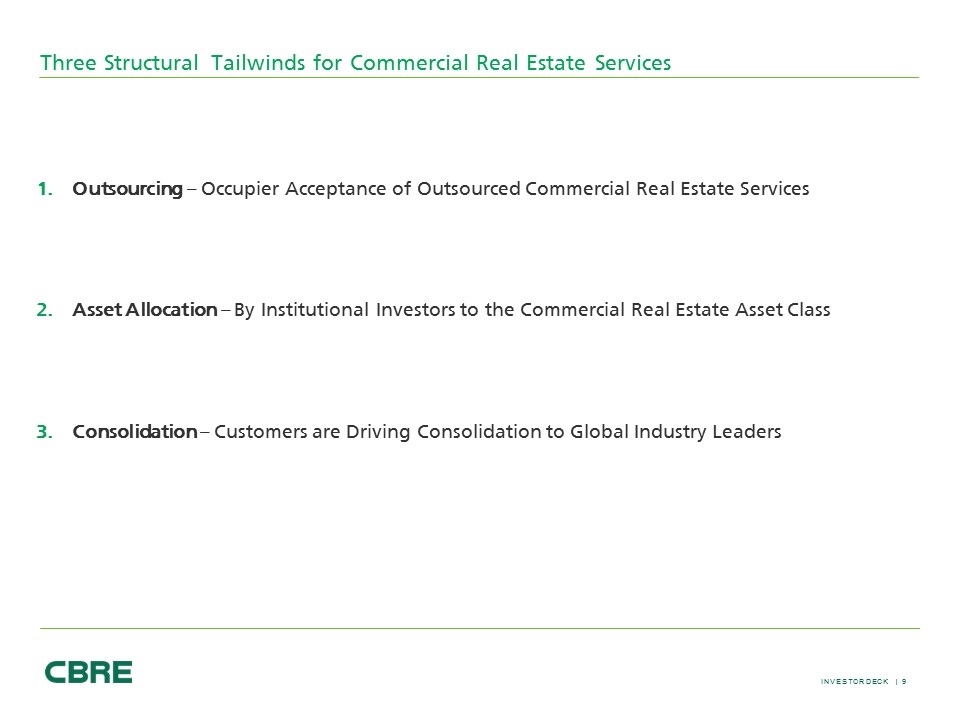
Three Structural Tailwinds for Commercial Real Estate Services Outsourcing – Occupier Acceptance of Outsourced Commercial Real Estate Services Asset Allocation – By Institutional Investors to the Commercial Real Estate Asset Class Consolidation – Customers are Driving Consolidation to Global Industry Leaders
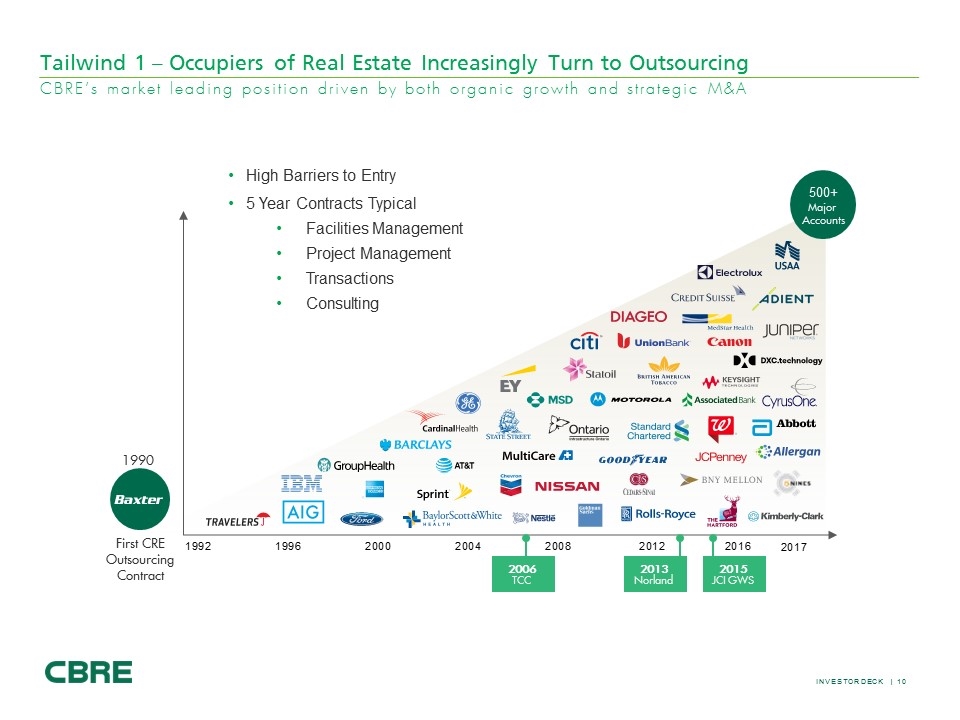
2006 TCC 2013 Norland 2015 JCI GWS 1990 First CRE Outsourcing Contract 500+ Major Accounts High Barriers to Entry 5 Year Contracts Typical Facilities Management Project Management Transactions Consulting Tailwind 1 – Occupiers of Real Estate Increasingly Turn to Outsourcing CBRE’s market leading position driven by both organic growth and strategic M&A
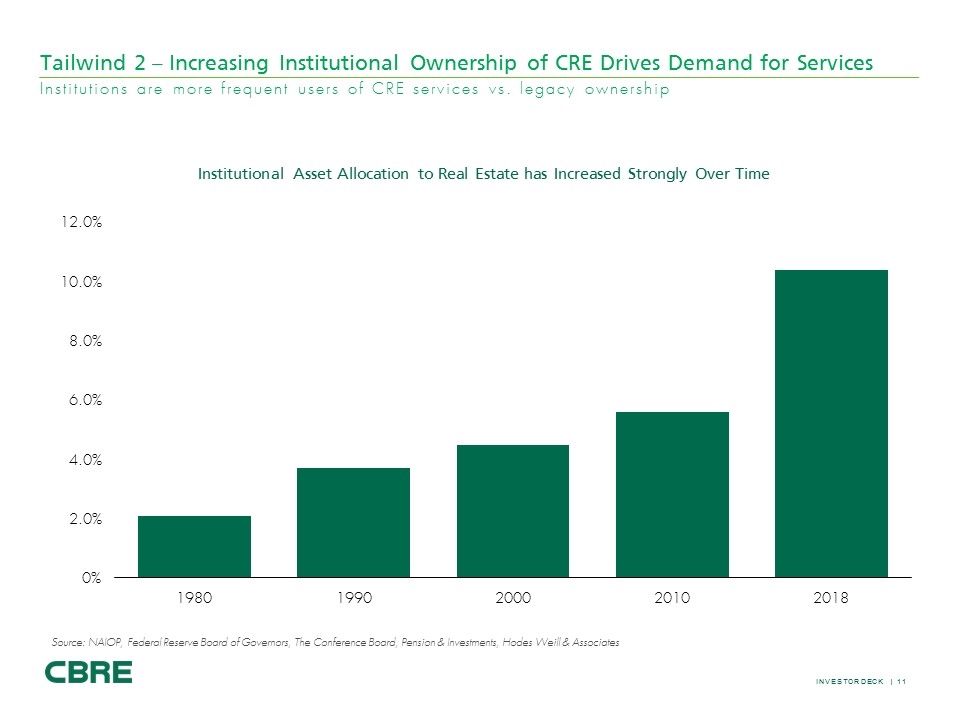
Tailwind 2 – Increasing Institutional Ownership of CRE Drives Demand for Services Institutions are more frequent users of CRE services vs. legacy ownership Institutional Asset Allocation to Real Estate has Increased Strongly Over Time Source: NAIOP, Federal Reserve Board of Governors, The Conference Board, Pension & Investments, Hodes Weill & Associates
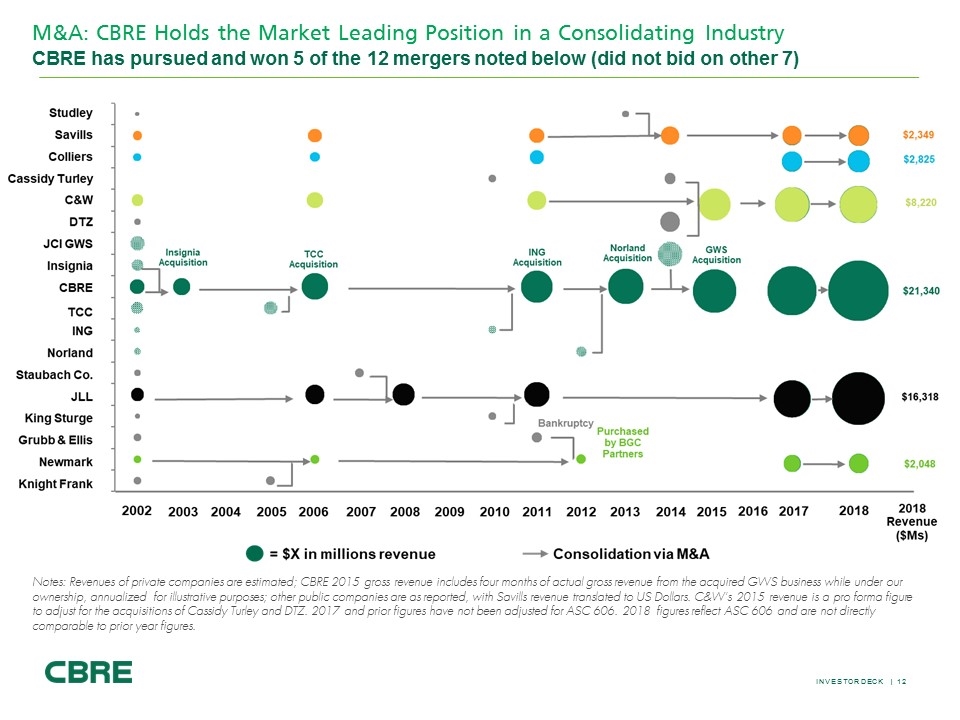
Notes: Revenues of private companies are estimated; CBRE 2015 gross revenue includes four months of actual gross revenue from the acquired GWS business while under our ownership, annualized for illustrative purposes; other public companies are as reported, with Savills revenue translated to US Dollars. C&W’s 2015 revenue is a pro forma figure to adjust for the acquisitions of Cassidy Turley and DTZ. 2017 and prior figures have not been adjusted for ASC 606. 2018 figures reflect ASC 606 and are not directly comparable to prior year figures. M&A: CBRE Holds the Market Leading Position in a Consolidating Industry CBRE has pursued and won 5 of the 12 mergers noted below (did not bid on other 7)
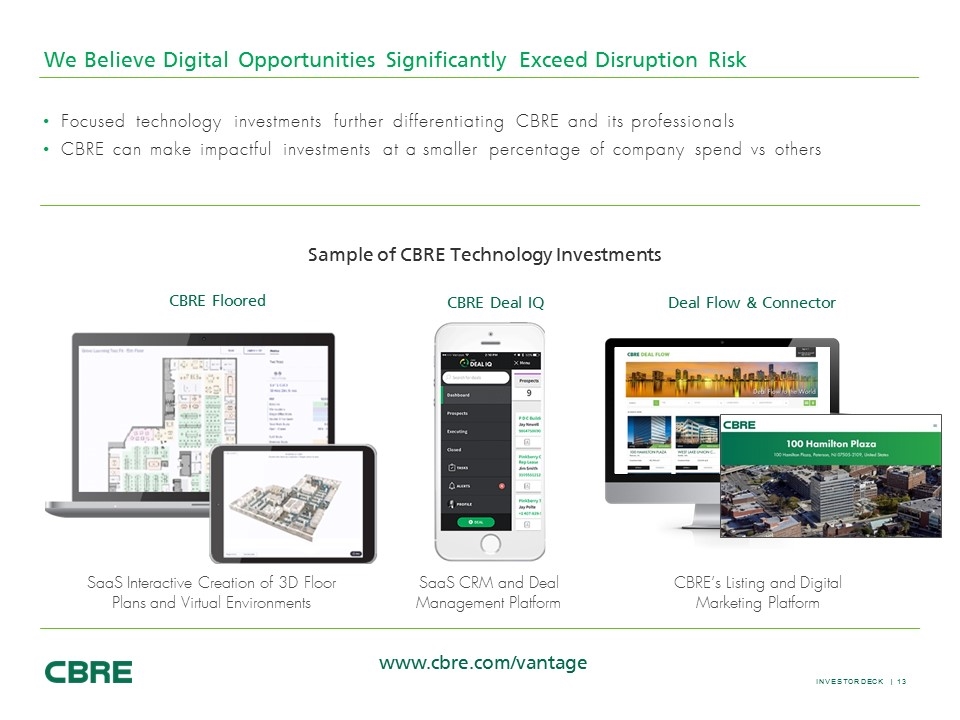
Focused technology investments further differentiating CBRE and its professionals CBRE can make impactful investments at a smaller percentage of company spend vs others CBRE Floored SaaS Interactive Creation of 3D Floor Plans and Virtual Environments Sample of CBRE Technology Investments www.cbre.com/vantage CBRE Deal IQ Deal Flow & Connector CBRE’s Listing and Digital Marketing Platform SaaS CRM and Deal Management Platform We Believe Digital Opportunities Significantly Exceed Disruption Risk
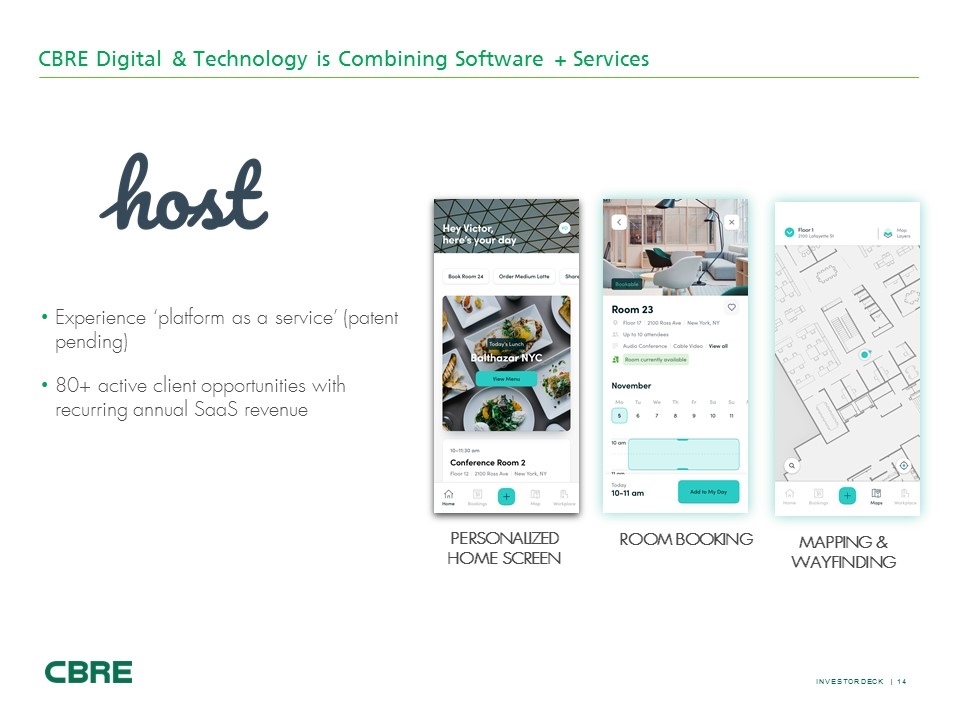
Experience ‘platform as a service’ (patent pending) 80+ active client opportunities with recurring annual SaaS revenue CBRE Digital & Technology is Combining Software + Services PERSONALIZED HOME SCREEN ROOM BOOKING MAPPING & WAYFINDING
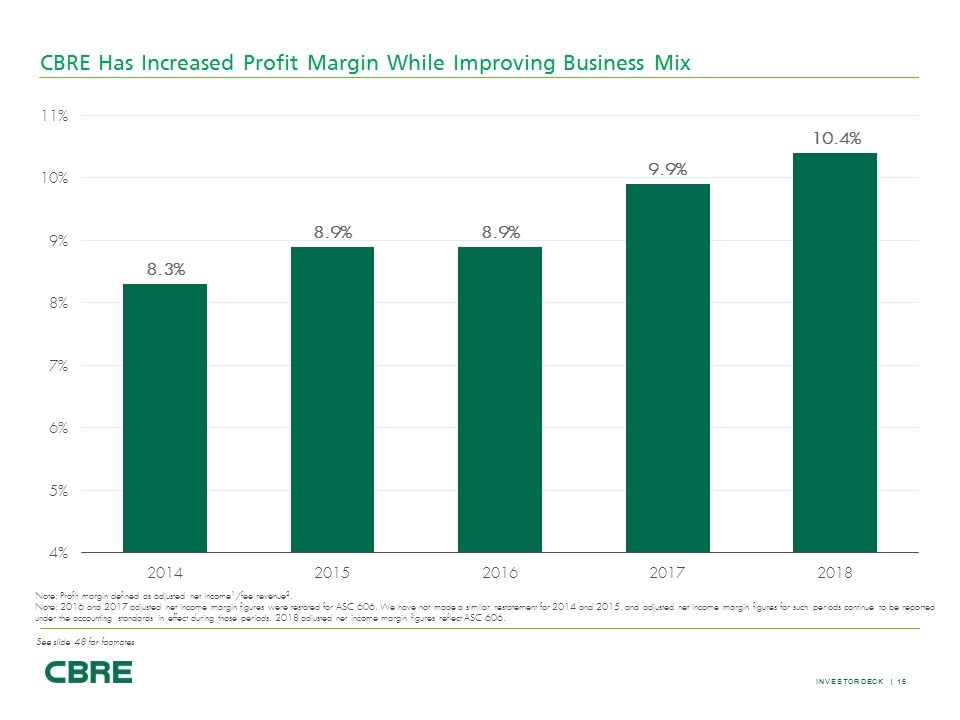
Note: Profit margin defined as adjusted net income1/fee revenue2. Note: 2016 and 2017 adjusted net income margin figures were restated for ASC 606. We have not made a similar restatement for 2014 and 2015, and adjusted net income margin figures for such periods continue to be reported under the accounting standards in effect during those periods. 2018 adjusted net income margin figures reflect ASC 606. CBRE Has Increased Profit Margin While Improving Business Mix See slide 48 for footnotes
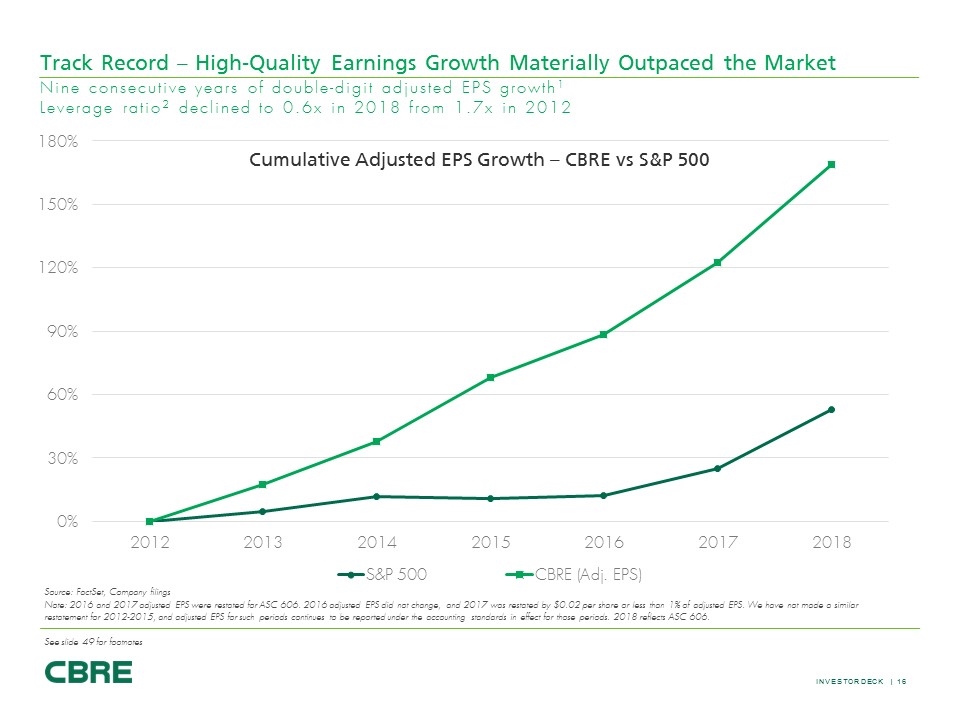
Track Record – High-Quality Earnings Growth Materially Outpaced the Market Nine consecutive years of double-digit adjusted EPS growth1 Leverage ratio2 declined to 0.6x in 2018 from 1.7x in 2012 Source: FactSet, Company filings Note: 2016 and 2017 adjusted EPS were restated for ASC 606. 2016 adjusted EPS did not change, and 2017 was restated by $0.02 per share or less than 1% of adjusted EPS. We have not made a similar restatement for 2012-2015, and adjusted EPS for such periods continues to be reported under the accounting standards in effect for those periods. 2018 reflects ASC 606. Cumulative Adjusted EPS Growth – CBRE vs S&P 500 See slide 49 for footnotes

CBRE’s Three Global Segments
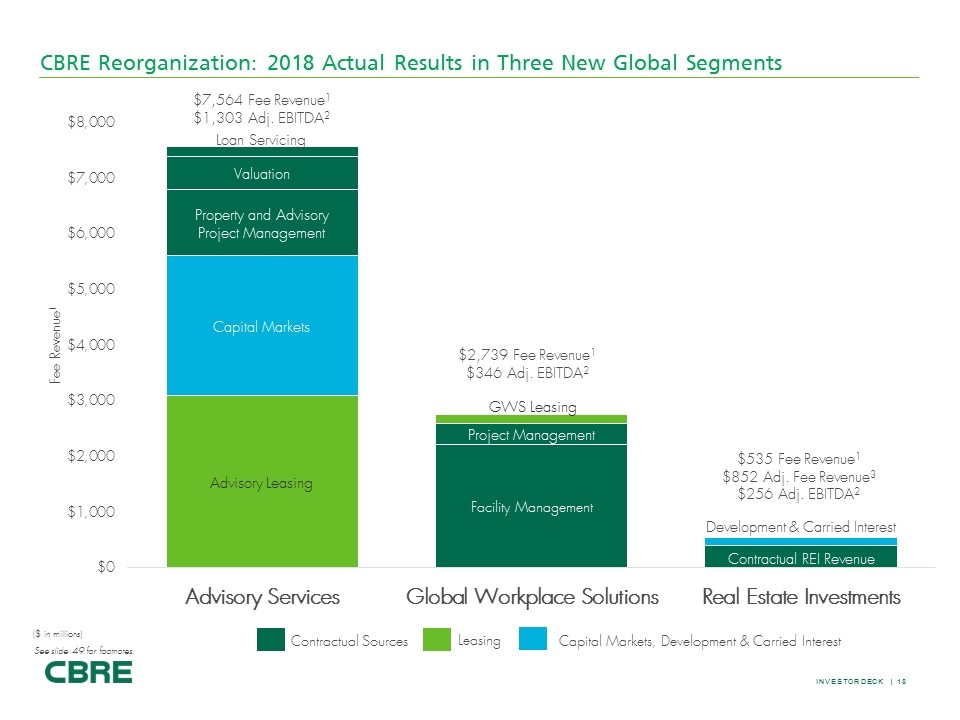
Capital Markets, Development & Carried Interest Leasing Contractual Sources ($ in millions) See slide 49 for footnotes. $7,564 Fee Revenue1 $1,303 Adj. EBITDA2 $535 Fee Revenue1 $852 Adj. Fee Revenue3 $256 Adj. EBITDA2 $2,739 Fee Revenue1 $346 Adj. EBITDA2 CBRE Reorganization: 2018 Actual Results in Three New Global Segments
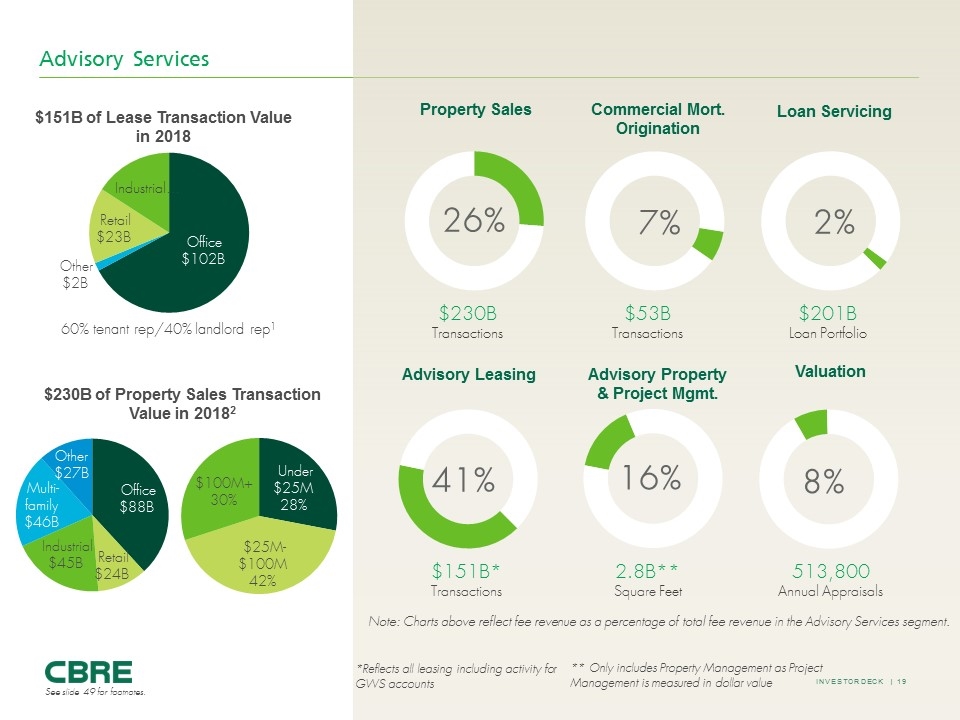
Advisory Services Property Sales Loan Servicing Advisory Leasing Advisory Property & Project Mgmt. Commercial Mort. Origination Valuation $230B Transactions $53B Transactions $151B* Transactions 2.8B** Square Feet 513,800 Annual Appraisals *Reflects all leasing including activity for GWS accounts ** Only includes Property Management as Project Management is measured in dollar value $201B Loan Portfolio See slide 49 for footnotes. $151B of Lease Transaction Value in 2018 60% tenant rep/40% landlord rep1 $230B of Property Sales Transaction Value in 20182 Note: Charts above reflect fee revenue as a percentage of total fee revenue in the Advisory Services segment.
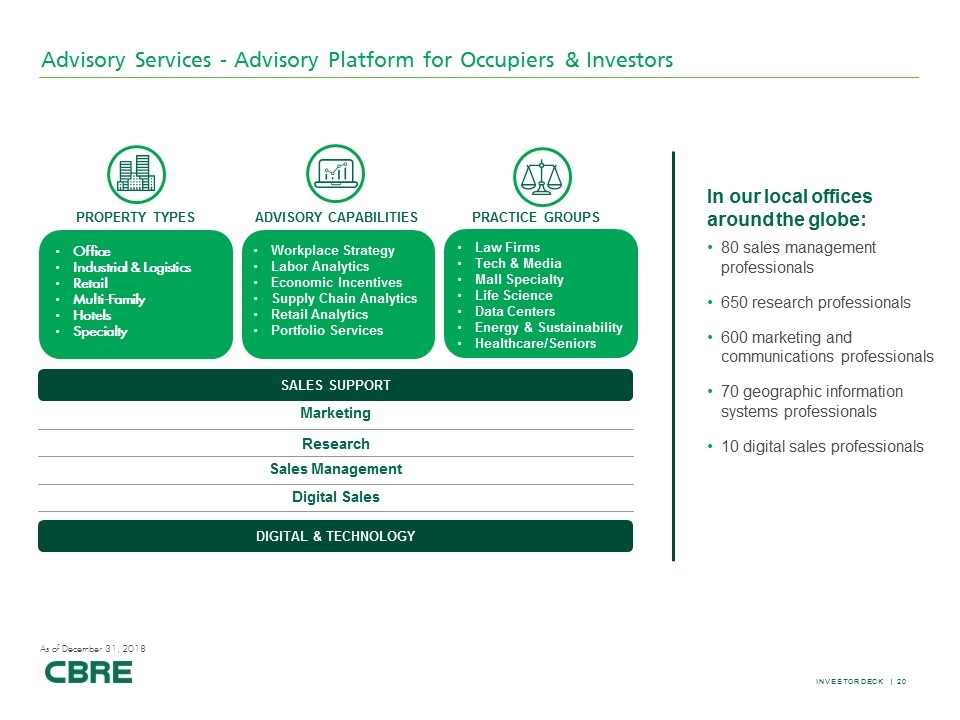
Advisory Services - Advisory Platform for Occupiers & Investors Office Industrial & Logistics Retail Multi-Family Hotels Specialty PROPERTY TYPES Workplace Strategy Labor Analytics Economic Incentives Supply Chain Analytics Retail Analytics Portfolio Services ADVISORY CAPABILITIES Law Firms Tech & Media Mall Specialty Life Science Data Centers Energy & Sustainability Healthcare/Seniors PRACTICE GROUPS SALES SUPPORT Research Marketing Sales Management Digital Sales In our local offices around the globe: 80 sales management professionals 650 research professionals 600 marketing and communications professionals 70 geographic information systems professionals 10 digital sales professionals As of December 31, 2018 DIGITAL & TECHNOLOGY
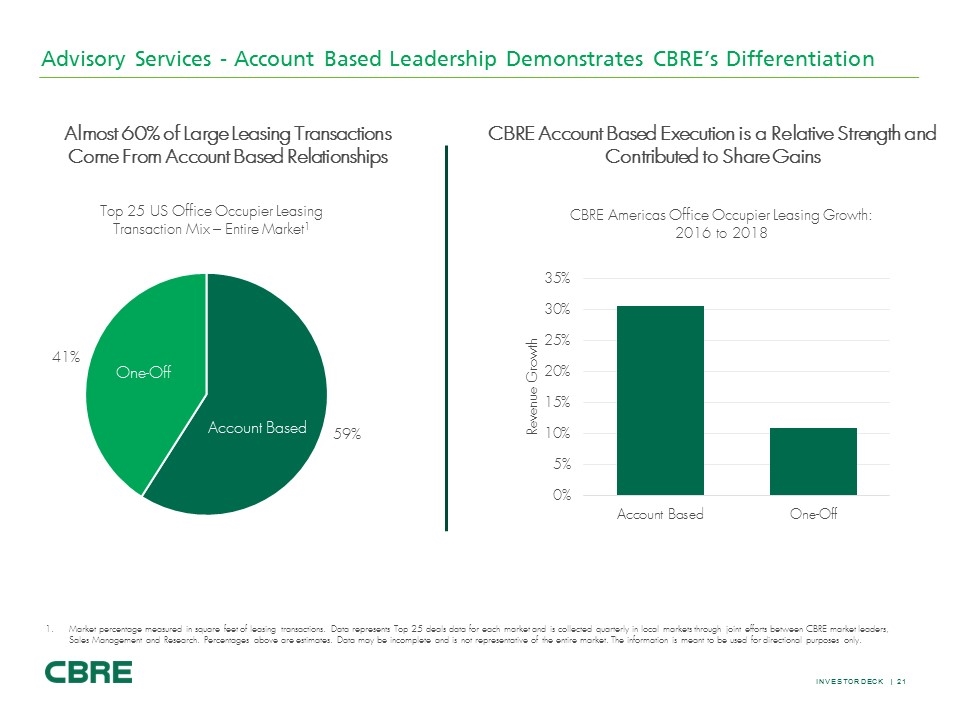
Advisory Services - Account Based Leadership Demonstrates CBRE’s Differentiation Almost 60% of Large Leasing Transactions Come From Account Based Relationships CBRE Account Based Execution is a Relative Strength and Contributed to Share Gains Market percentage measured in square feet of leasing transactions. Data represents Top 25 deals data for each market and is collected quarterly in local markets through joint efforts between CBRE market leaders, Sales Management and Research. Percentages above are estimates. Data may be incomplete and is not representative of the entire market. The information is meant to be used for directional purposes only. Top 25 US Office Occupier Leasing Transaction Mix – Entire Market1 CBRE Americas Office Occupier Leasing Growth: 2016 to 2018 Account Based One-Off
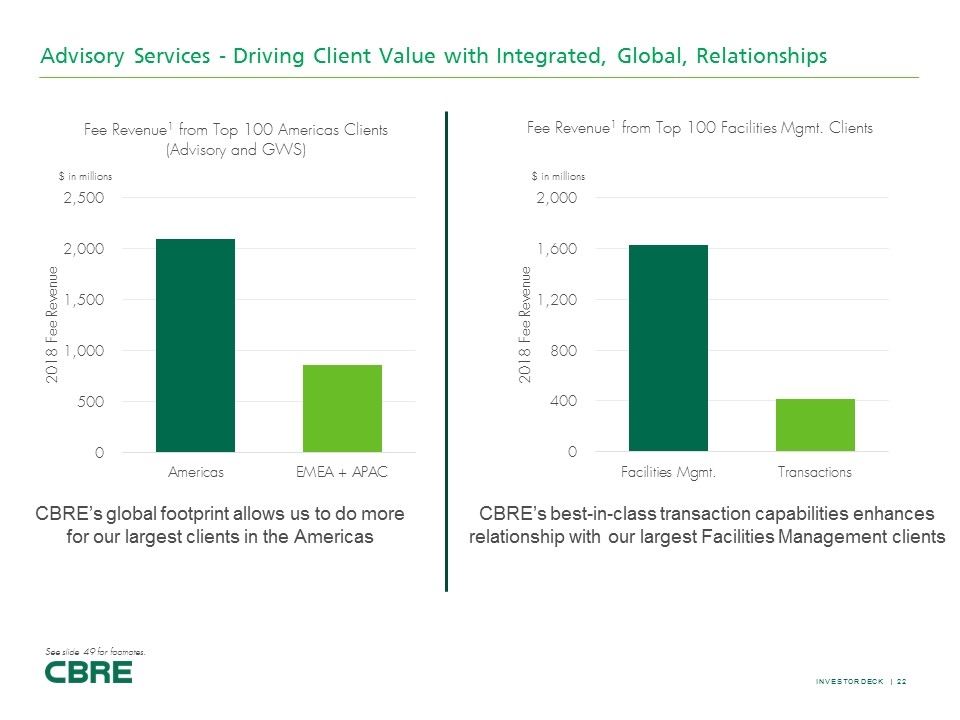
Advisory Services - Driving Client Value with Integrated, Global, Relationships Fee Revenue1 from Top 100 Americas Clients (Advisory and GWS) Fee Revenue1 from Top 100 Facilities Mgmt. Clients CBRE’s global footprint allows us to do more for our largest clients in the Americas CBRE’s best-in-class transaction capabilities enhances relationship with our largest Facilities Management clients $ in millions $ in millions See slide 49 for footnotes.
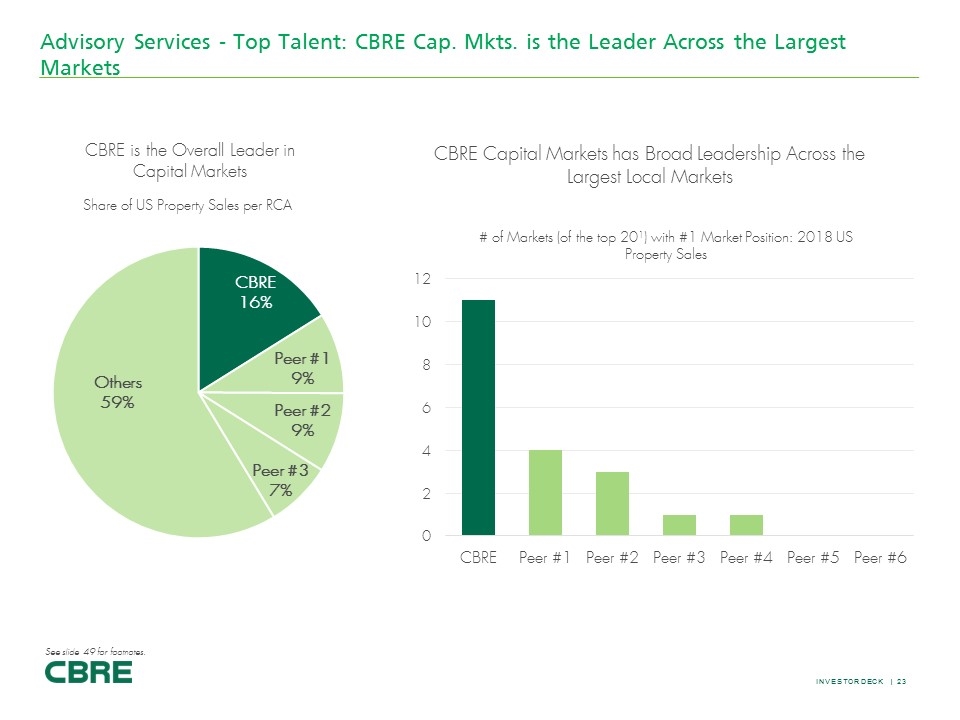
Advisory Services - Top Talent: CBRE Cap. Mkts. is the Leader Across the Largest Markets CBRE is the Overall Leader in Capital Markets Share of US Property Sales per RCA CBRE Capital Markets has Broad Leadership Across the Largest Local Markets See slide 49 for footnotes.
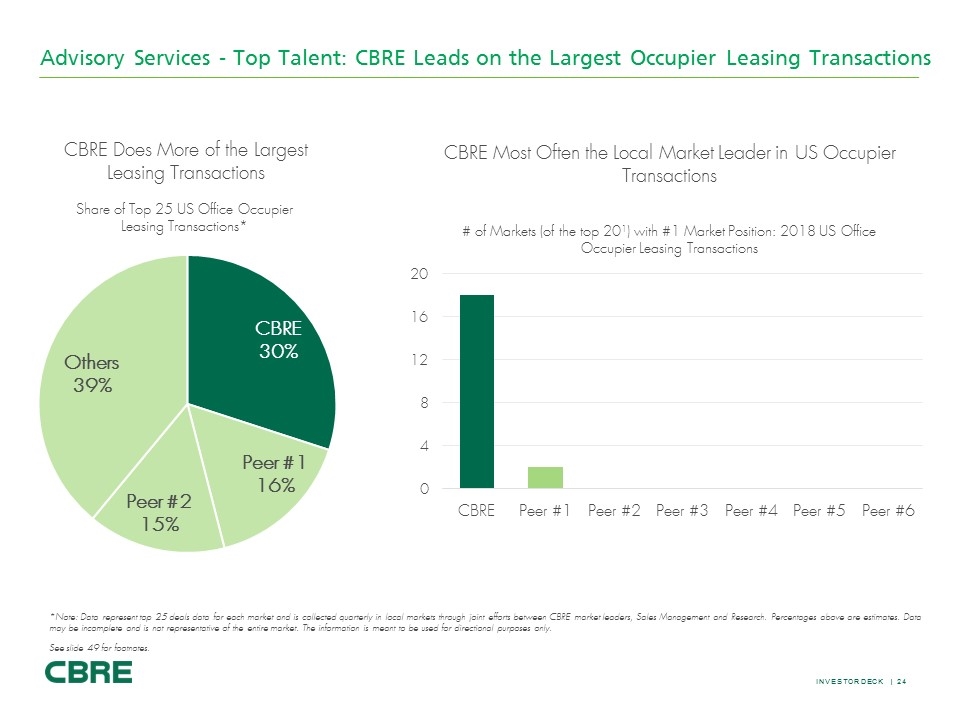
Advisory Services - Top Talent: CBRE Leads on the Largest Occupier Leasing Transactions CBRE Does More of the Largest Leasing Transactions Share of Top 25 US Office Occupier Leasing Transactions* CBRE Most Often the Local Market Leader in US Occupier Transactions *Note: Data represent top 25 deals data for each market and is collected quarterly in local markets through joint efforts between CBRE market leaders, Sales Management and Research. Percentages above are estimates. Data may be incomplete and is not representative of the entire market. The information is meant to be used for directional purposes only. See slide 49 for footnotes.
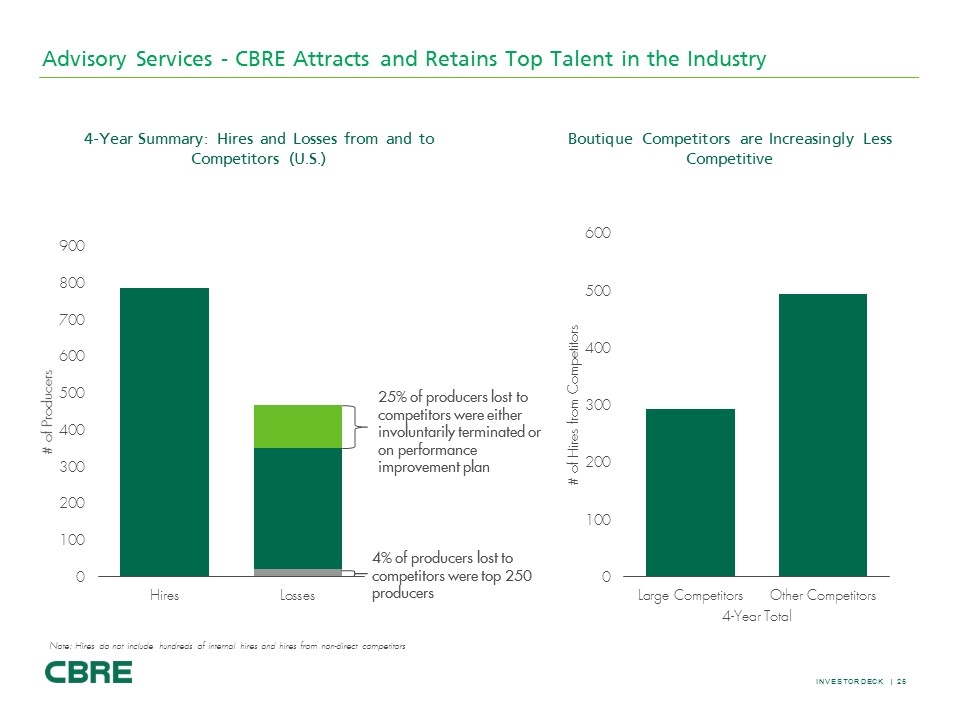
Advisory Services - CBRE Attracts and Retains Top Talent in the Industry 4-Year Summary: Hires and Losses from and to Competitors (U.S.) Boutique Competitors are Increasingly Less Competitive Note: Hires do not include hundreds of internal hires and hires from non-direct competitors 25% of producers lost to competitors were either involuntarily terminated or on performance improvement plan 4% of producers lost to competitors were top 250 producers
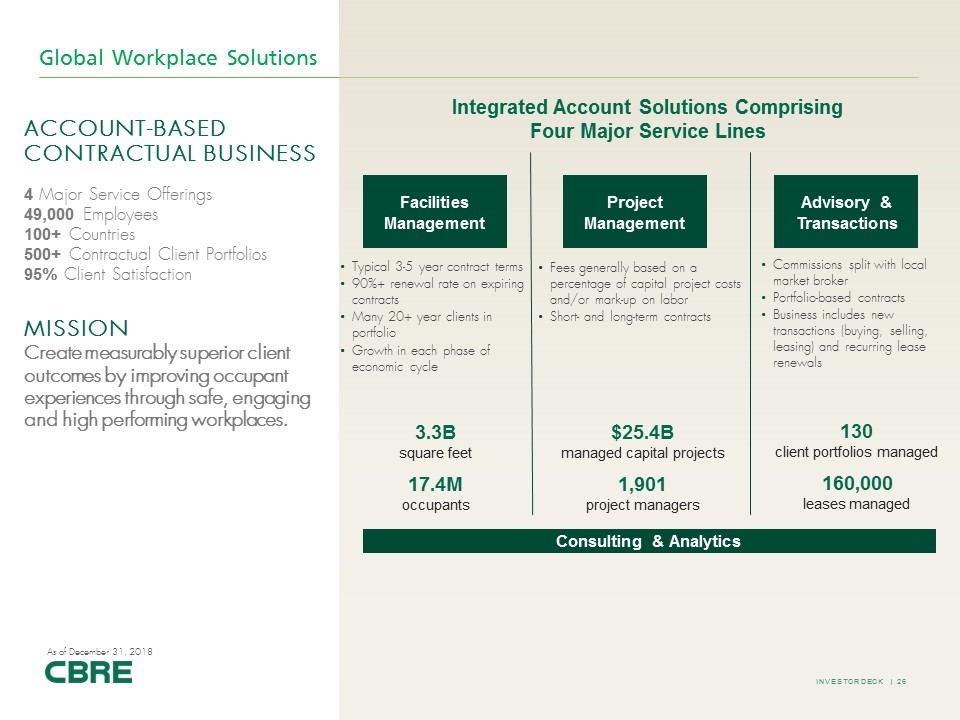
Global Workplace Solutions Account-Based Contractual Business 4 Major Service Offerings 49,000 Employees 100+ Countries 500+ Contractual Client Portfolios 95% Client Satisfaction Mission Create measurably superior client outcomes by improving occupant experiences through safe, engaging and high performing workplaces. 3.3B square feet 17.4M occupants Facilities Management 130 client portfolios managed 160,000 leases managed Advisory & Transactions $25.4B managed capital projects 1,901 project managers Project Management Consulting & Analytics Integrated Account Solutions Comprising Four Major Service Lines As of December 31, 2018 Commissions split with local market broker Portfolio-based contracts Business includes new transactions (buying, selling, leasing) and recurring lease renewals Fees generally based on a percentage of capital project costs and/or mark-up on labor Short- and long-term contracts Typical 3-5 year contract terms 90%+ renewal rate on expiring contracts Many 20+ year clients in portfolio Growth in each phase of economic cycle
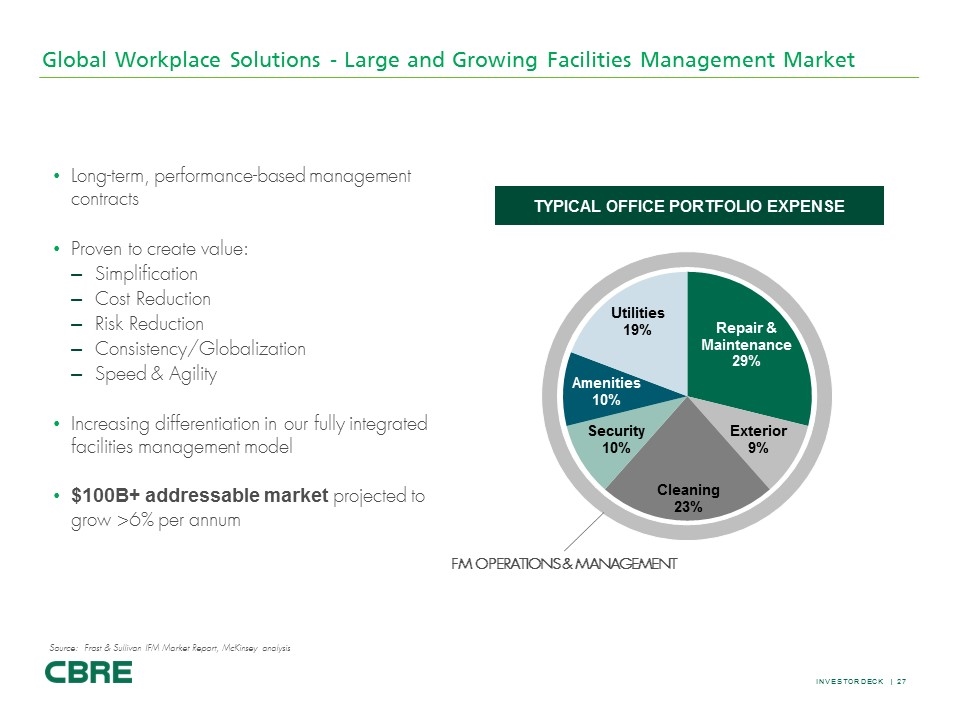
Global Workplace Solutions - Large and Growing Facilities Management Market Long-term, performance-based management contracts Proven to create value: Simplification Cost Reduction Risk Reduction Consistency/Globalization Speed & Agility Increasing differentiation in our fully integrated facilities management model $100B+ addressable market projected to grow >6% per annum Typical office portfolio EXPENSE FM OPERATIONS & Management Source: Frost & Sullivan IFM Market Report, McKinsey analysis
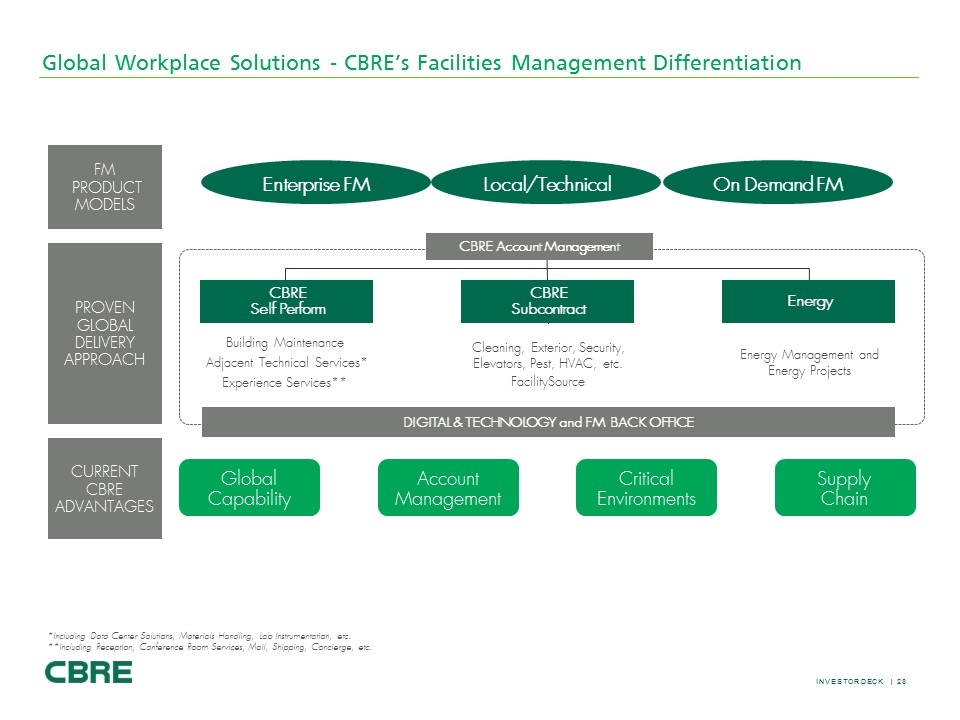
CBRE Self Perform CBRE Subcontract Energy CBRE Account Management Building Maintenance Adjacent Technical Services* Experience Services** Energy Management and Energy Projects Cleaning, Exterior, Security, Elevators, Pest, HVAC, etc. FacilitySource DIGITAL & TECHNOLOGY and FM BACK OFFICE Enterprise FM Local/Technical FM PRODUCT MODELS On Demand FM PROVEN GLOBAL DELIVERY APPROACH CURRENT CBRE ADVANTAGES Global Capability Account Management Critical Environments Supply Chain *Including Data Center Solutions, Materials Handling, Lab Instrumentation, etc. **Including Reception, Conference Room Services, Mail, Shipping, Concierge, etc. Global Workplace Solutions - CBRE’s Facilities Management Differentiation
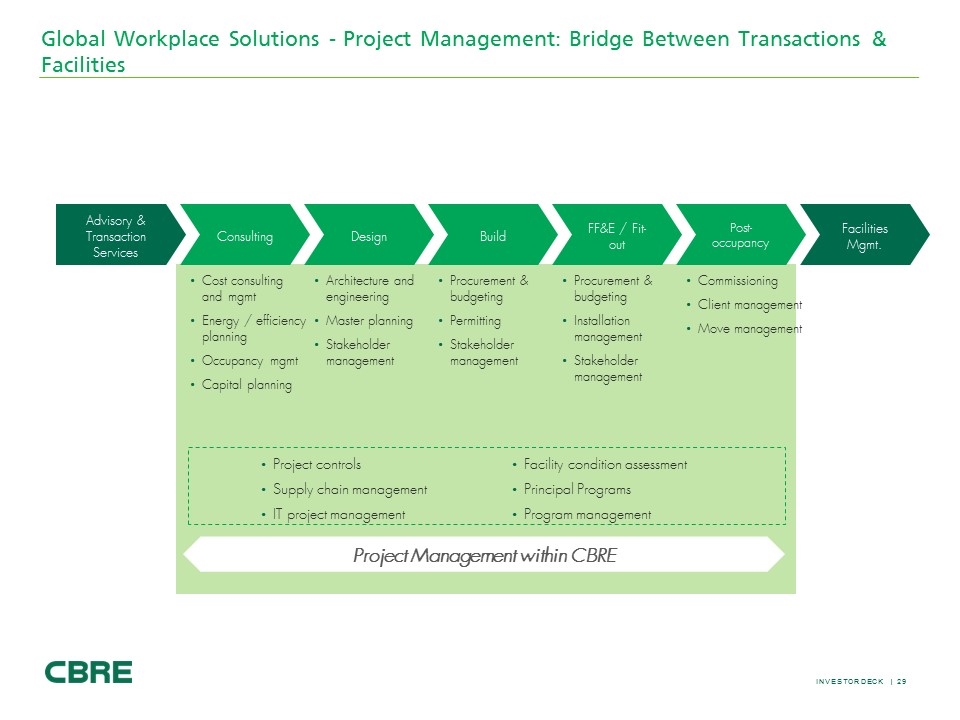
Global Workplace Solutions - Project Management: Bridge Between Transactions & Facilities Advisory & Transaction Services Design Cost consulting and mgmt Energy / efficiency planning Occupancy mgmt Capital planning Architecture and engineering Master planning Stakeholder management Consulting Project Management within CBRE Post-occupancy Facilities Mgmt. Build FF&E / Fit-out Procurement & budgeting Permitting Stakeholder management Commissioning Client management Move management Procurement & budgeting Installation management Stakeholder management Facility condition assessment Principal Programs Program management Project controls Supply chain management IT project management
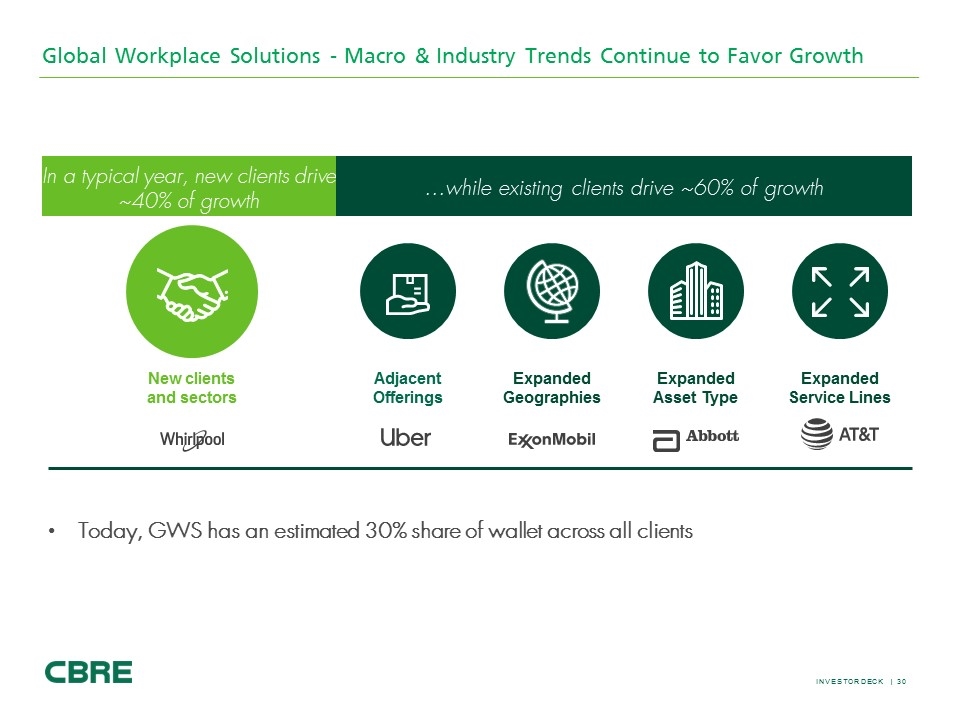
Global Workplace Solutions - Macro & Industry Trends Continue to Favor Growth In a typical year, new clients drive ~40% of growth …while existing clients drive ~60% of growth New clients and sectors Adjacent Offerings Expanded Geographies Expanded Asset Type Expanded Service Lines Today, GWS has an estimated 30% share of wallet across all clients
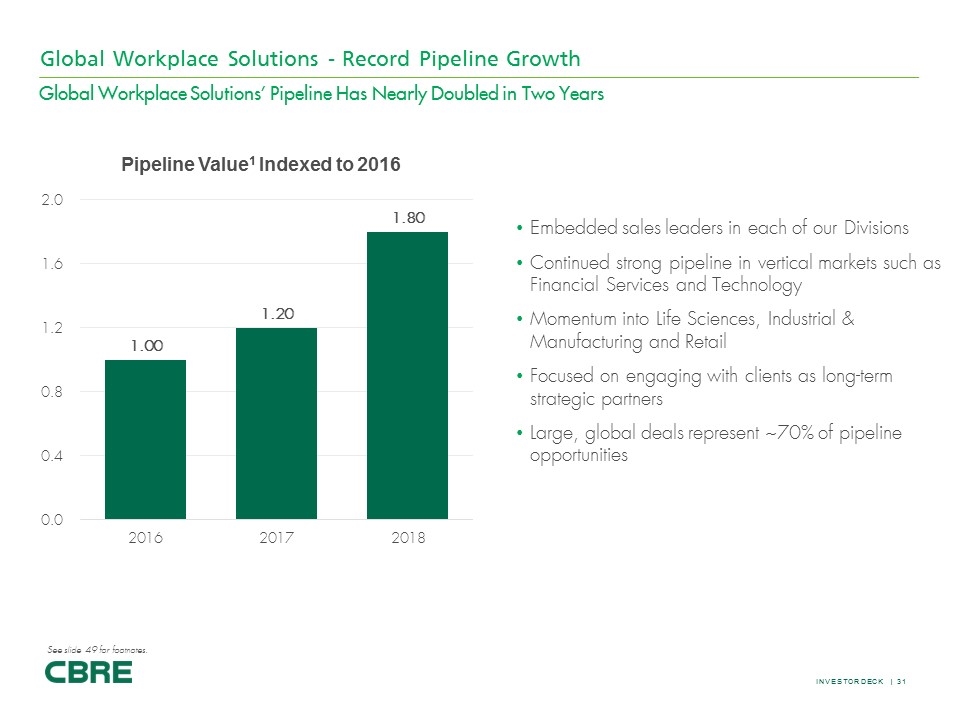
Global Workplace Solutions - Record Pipeline Growth Global Workplace Solutions’ Pipeline Has Nearly Doubled in Two Years Pipeline Value1 Indexed to 2016 Embedded sales leaders in each of our Divisions Continued strong pipeline in vertical markets such as Financial Services and Technology Momentum into Life Sciences, Industrial & Manufacturing and Retail Focused on engaging with clients as long-term strategic partners Large, global deals represent ~70% of pipeline opportunities See slide 49 for footnotes.
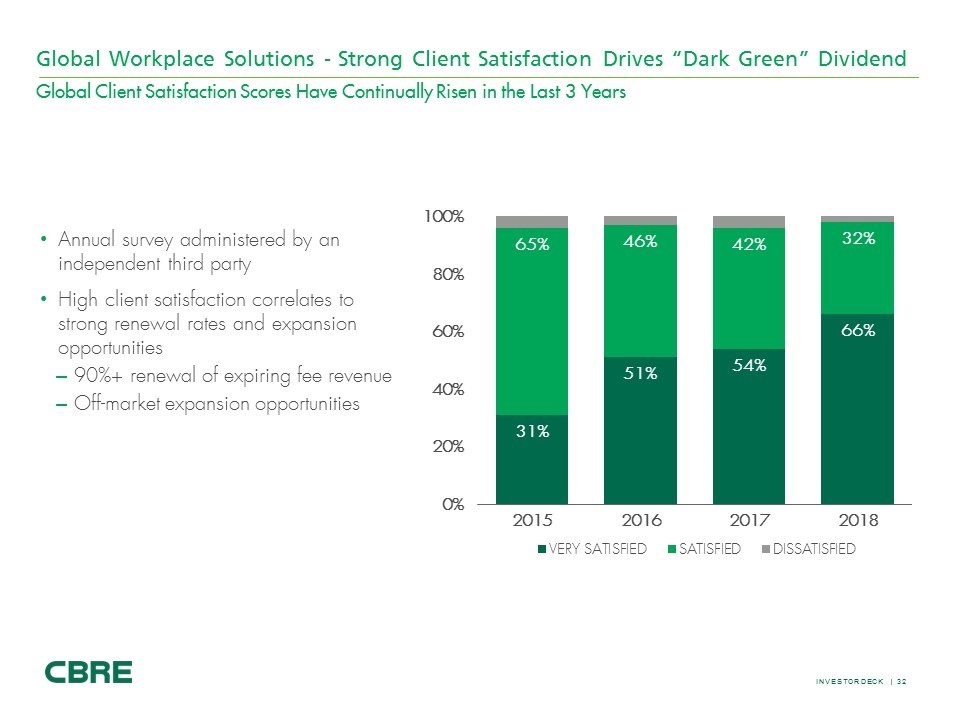
Global Workplace Solutions - Strong Client Satisfaction Drives “Dark Green” Dividend Global Client Satisfaction Scores Have Continually Risen in the Last 3 Years Annual survey administered by an independent third party High client satisfaction correlates to strong renewal rates and expansion opportunities 90%+ renewal of expiring fee revenue Off-market expansion opportunities
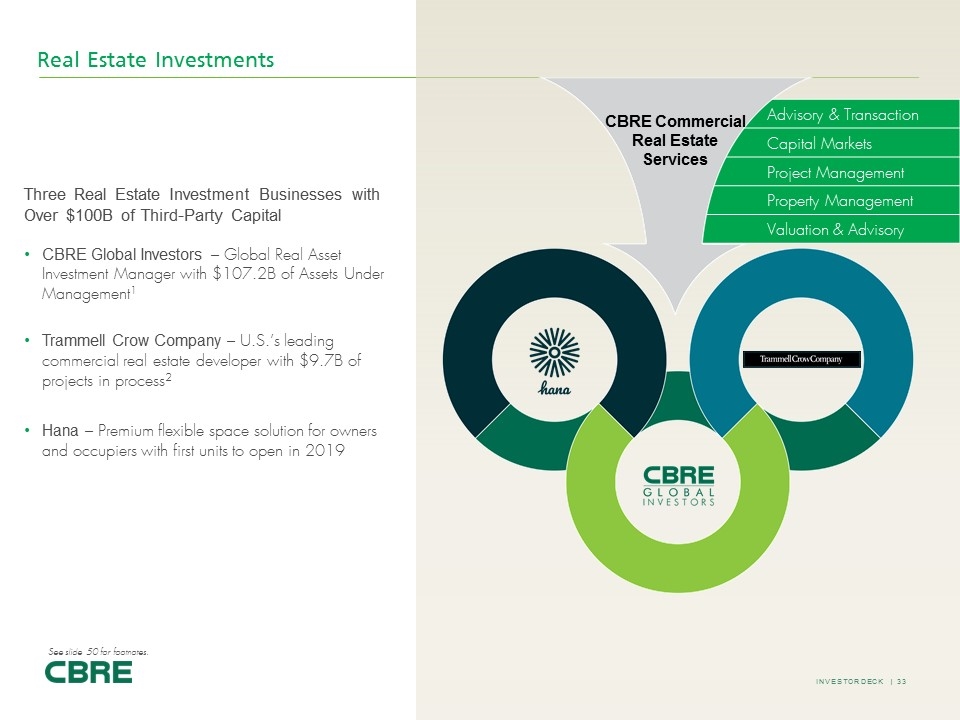
Advisory & Transaction Capital Markets Project Management Property Management Valuation & Advisory Real Estate Investments CBRE Commercial Real Estate Services Three Real Estate Investment Businesses with Over $100B of Third-Party Capital CBRE Global Investors – Global Real Asset Investment Manager with $107.2B of Assets Under Management1 Trammell Crow Company – U.S.’s leading commercial real estate developer with $9.7B of projects in process2 Hana – Premium flexible space solution for owners and occupiers with first units to open in 2019 See slide 50 for footnotes.
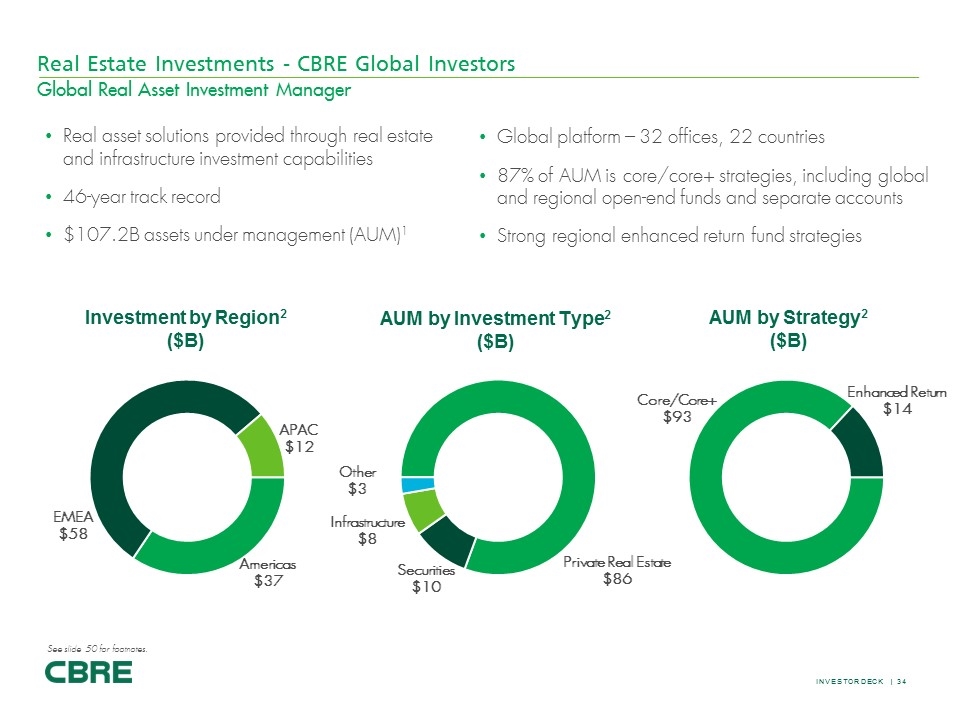
Real Estate Investments - CBRE Global Investors Global Real Asset Investment Manager Real asset solutions provided through real estate and infrastructure investment capabilities 46-year track record $107.2B assets under management (AUM)1 AUM by Investment Type2 ($B) AUM by Strategy2 ($B) Investment by Region2 ($B) Global platform – 32 offices, 22 countries 87% of AUM is core/core+ strategies, including global and regional open-end funds and separate accounts Strong regional enhanced return fund strategies See slide 50 for footnotes.
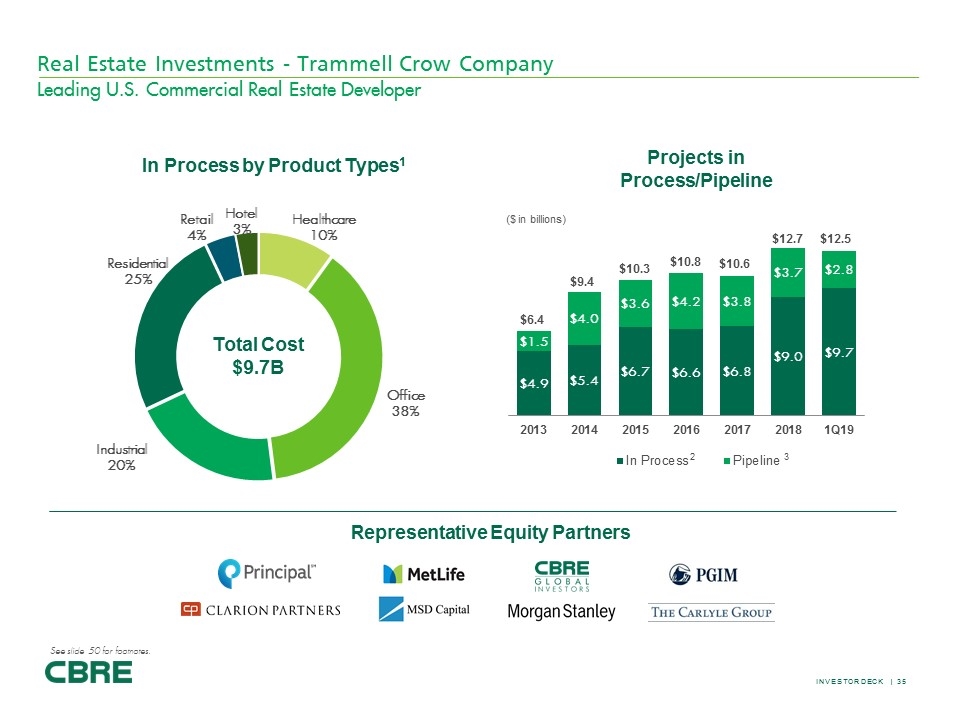
Real Estate Investments - Trammell Crow Company Leading U.S. Commercial Real Estate Developer Representative Equity Partners In Process by Product Types1 Projects in Process/Pipeline ($ in billions) Total Cost $9.7B 2 3 See slide 50 for footnotes. $12.5
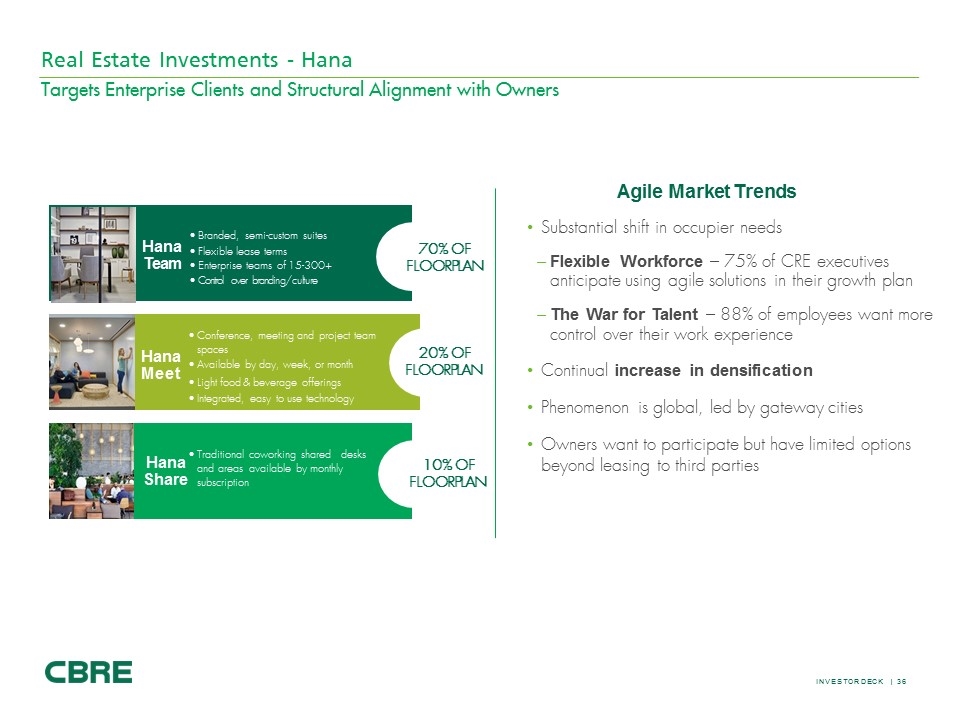
Targets Enterprise Clients and Structural Alignment with Owners Branded, semi-custom suites Flexible lease terms Enterprise teams of 15-300+ Control over branding/culture Conference, meeting and project team spaces Available by day, week, or month Light food & beverage offerings Integrated, easy to use technology Traditional coworking shared desks and areas available by monthly subscription Hana Team Hana Meet Hana Share 70% OF FLOORPLAN 20% OF FLOORPLAN 10% OF FLOORPLAN Real Estate Investments - Hana Agile Market Trends Substantial shift in occupier needs Flexible Workforce – 75% of CRE executives anticipate using agile solutions in their growth plan The War for Talent – 88% of employees want more control over their work experience Continual increase in densification Phenomenon is global, led by gateway cities Owners want to participate but have limited options beyond leasing to third parties

appendix
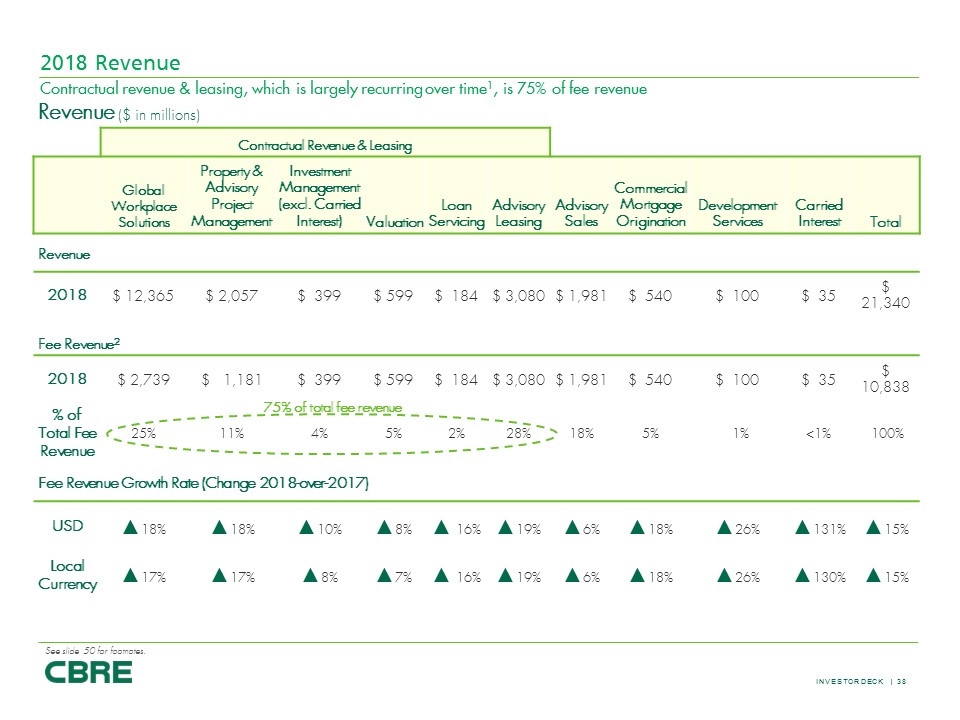
See slide 50 for footnotes. Revenue ($ in millions) Contractual Revenue & Leasing Global Workplace Solutions Property & Advisory Project Management Investment Management (excl. Carried Interest) Valuation Loan Servicing Advisory Leasing Advisory Sales Commercial Mortgage Origination Development Services Carried Interest Total Revenue 2018 $ 12,365 $ 2,057 $ 399 $ 599 $ 184 $ 3,080 $ 1,981 $ 540 $ 100 $ 35 $ 21,340 Fee Revenue2 2018 $ 2,739 $ 1,181 $ 399 $ 599 $ 184 $ 3,080 $ 1,981 $ 540 $ 100 $ 35 $ 10,838 % of Total Fee Revenue 25% 11% 4% 5% 2% 28% 18% 5% 1% <1% 100% Fee Revenue Growth Rate (Change 2018-over-2017) USD ▲18% ▲18% ▲10% ▲8% ▲ 16% ▲19% ▲6% ▲18% ▲26% ▲131% ▲15% Local Currency ▲17% ▲17% ▲8% ▲7% ▲ 16% ▲19% ▲6% ▲18% ▲26% ▲130% ▲15% Contractual revenue & leasing, which is largely recurring over time1, is 75% of fee revenue 75% of total fee revenue 2018 Revenue
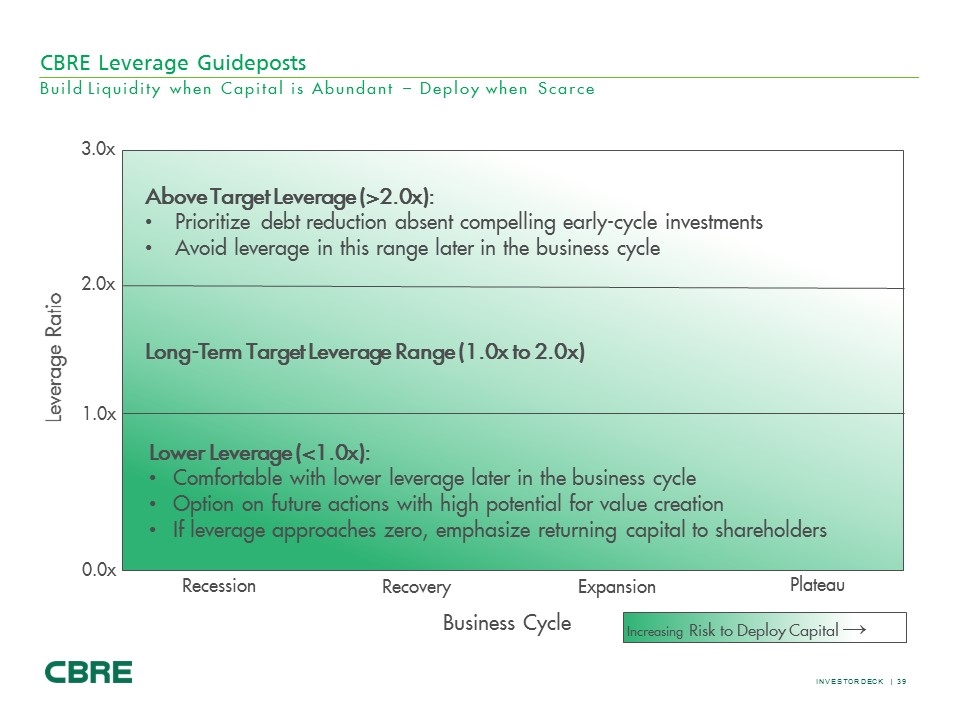
3.0x 0.0x 1.0x Leverage Ratio Recession Recovery Above Target Leverage (>2.0x): Prioritize debt reduction absent compelling early-cycle investments Avoid leverage in this range later in the business cycle Plateau Expansion Lower Leverage (<1.0x): Comfortable with lower leverage later in the business cycle Option on future actions with high potential for value creation If leverage approaches zero, emphasize returning capital to shareholders Long-Term Target Leverage Range (1.0x to 2.0x) 2.0x Business Cycle Increasing Risk to Deploy Capital → CBRE Leverage Guideposts Build Liquidity when Capital is Abundant – Deploy when Scarce
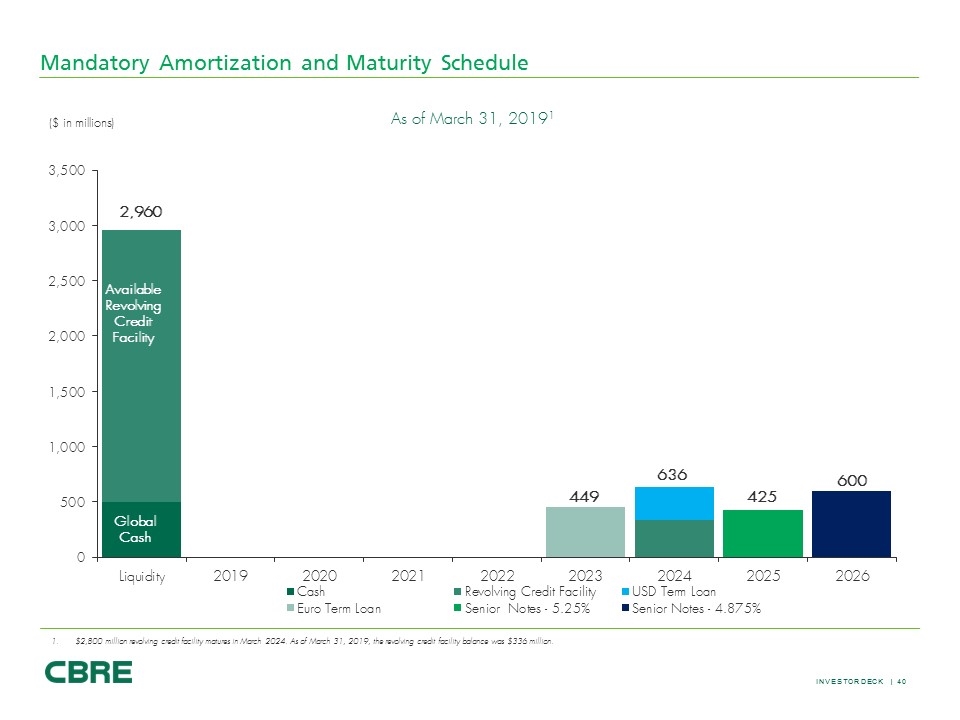
Mandatory Amortization and Maturity Schedule $2,800 million revolving credit facility matures in March 2024. As of March 31, 2019, the revolving credit facility balance was $336 million. Global Cash Available Revolving Credit Facility ($ in millions) As of March 31, 20191
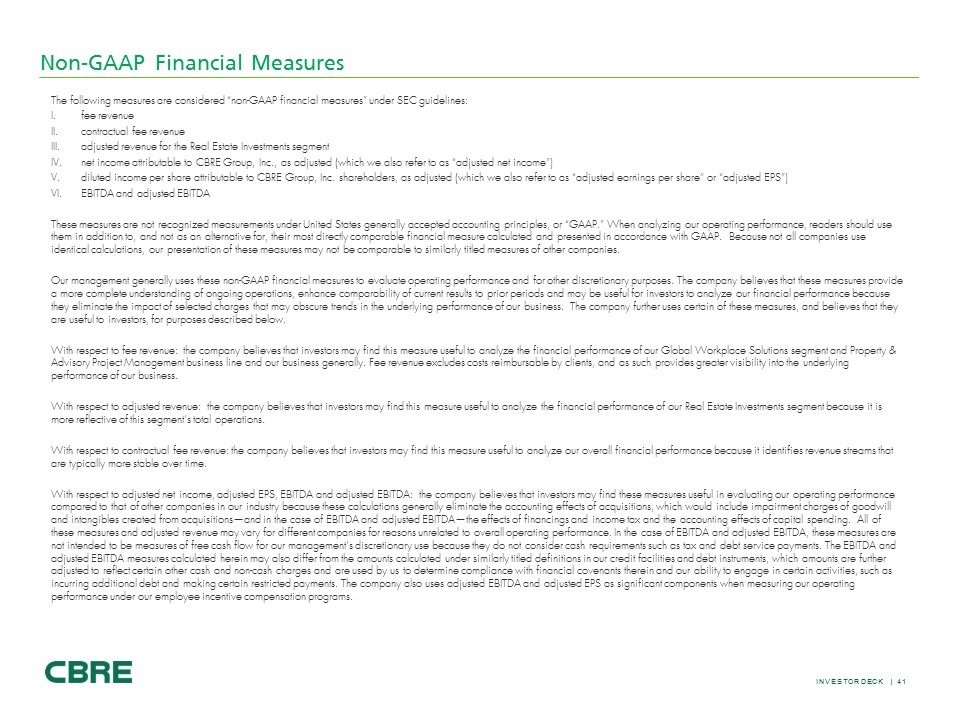
Non-GAAP Financial Measures The following measures are considered “non-GAAP financial measures” under SEC guidelines: fee revenue contractual fee revenue adjusted revenue for the Real Estate Investments segment net income attributable to CBRE Group, Inc., as adjusted (which we also refer to as “adjusted net income”) diluted income per share attributable to CBRE Group, Inc. shareholders, as adjusted (which we also refer to as “adjusted earnings per share” or “adjusted EPS”) EBITDA and adjusted EBITDA These measures are not recognized measurements under United States generally accepted accounting principles, or “GAAP.” When analyzing our operating performance, readers should use them in addition to, and not as an alternative for, their most directly comparable financial measure calculated and presented in accordance with GAAP. Because not all companies use identical calculations, our presentation of these measures may not be comparable to similarly titled measures of other companies. Our management generally uses these non-GAAP financial measures to evaluate operating performance and for other discretionary purposes. The company believes that these measures provide a more complete understanding of ongoing operations, enhance comparability of current results to prior periods and may be useful for investors to analyze our financial performance because they eliminate the impact of selected charges that may obscure trends in the underlying performance of our business. The company further uses certain of these measures, and believes that they are useful to investors, for purposes described below. With respect to fee revenue: the company believes that investors may find this measure useful to analyze the financial performance of our Global Workplace Solutions segment and Property & Advisory Project Management business line and our business generally. Fee revenue excludes costs reimbursable by clients, and as such provides greater visibility into the underlying performance of our business. With respect to adjusted revenue: the company believes that investors may find this measure useful to analyze the financial performance of our Real Estate Investments segment because it is more reflective of this segment’s total operations. With respect to contractual fee revenue: the company believes that investors may find this measure useful to analyze our overall financial performance because it identifies revenue streams that are typically more stable over time. With respect to adjusted net income, adjusted EPS, EBITDA and adjusted EBITDA: the company believes that investors may find these measures useful in evaluating our operating performance compared to that of other companies in our industry because these calculations generally eliminate the accounting effects of acquisitions, which would include impairment charges of goodwill and intangibles created from acquisitions—and in the case of EBITDA and adjusted EBITDA—the effects of financings and income tax and the accounting effects of capital spending. All of these measures and adjusted revenue may vary for different companies for reasons unrelated to overall operating performance. In the case of EBITDA and adjusted EBITDA, these measures are not intended to be measures of free cash flow for our management’s discretionary use because they do not consider cash requirements such as tax and debt service payments. The EBITDA and adjusted EBITDA measures calculated herein may also differ from the amounts calculated under similarly titled definitions in our credit facilities and debt instruments, which amounts are further adjusted to reflect certain other cash and non-cash charges and are used by us to determine compliance with financial covenants therein and our ability to engage in certain activities, such as incurring additional debt and making certain restricted payments. The company also uses adjusted EBITDA and adjusted EPS as significant components when measuring our operating performance under our employee incentive compensation programs.
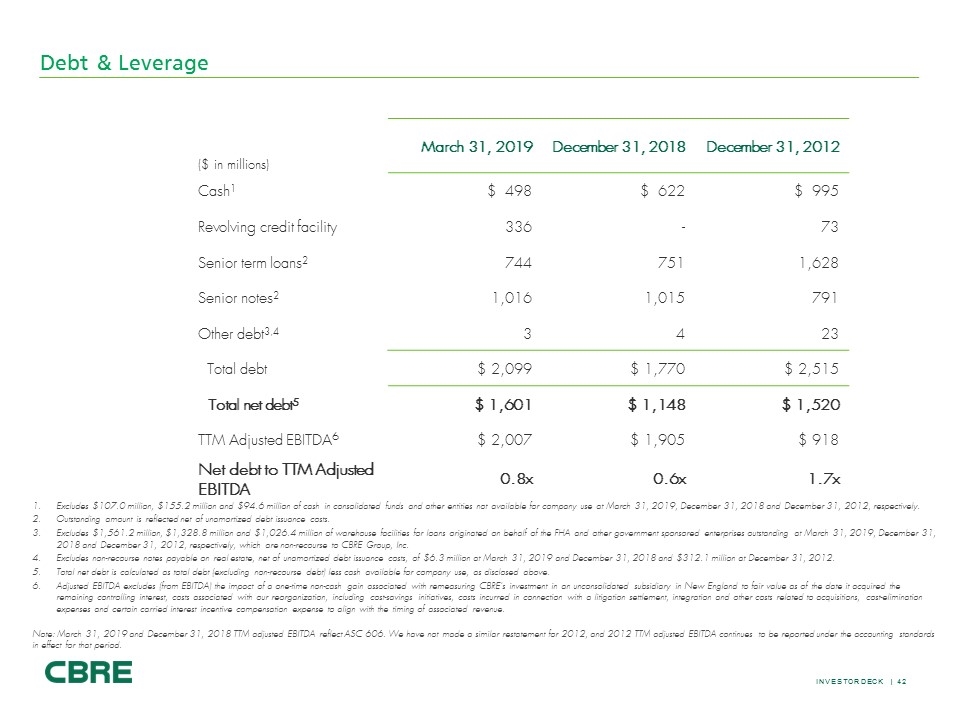
Debt & Leverage Excludes $107.0 million, $155.2 million and $94.6 million of cash in consolidated funds and other entities not available for company use at March 31, 2019, December 31, 2018 and December 31, 2012, respectively. Outstanding amount is reflected net of unamortized debt issuance costs. Excludes $1,561.2 million, $1,328.8 million and $1,026.4 million of warehouse facilities for loans originated on behalf of the FHA and other government sponsored enterprises outstanding at March 31, 2019, December 31, 2018 and December 31, 2012, respectively, which are non-recourse to CBRE Group, Inc. Excludes non-recourse notes payable on real estate, net of unamortized debt issuance costs, of $6.3 million at March 31, 2019 and December 31, 2018 and $312.1 million at December 31, 2012. Total net debt is calculated as total debt (excluding non-recourse debt) less cash available for company use, as disclosed above. Adjusted EBITDA excludes (from EBITDA) the impact of a one-time non-cash gain associated with remeasuring CBRE’s investment in an unconsolidated subsidiary in New England to fair value as of the date it acquired the remaining controlling interest, costs associated with our reorganization, including cost-savings initiatives, costs incurred in connection with a litigation settlement, integration and other costs related to acquisitions, cost-elimination expenses and certain carried interest incentive compensation expense to align with the timing of associated revenue. Note: March 31, 2019 and December 31, 2018 TTM adjusted EBITDA reflect ASC 606. We have not made a similar restatement for 2012, and 2012 TTM adjusted EBITDA continues to be reported under the accounting standards in effect for that period. ($ in millions) March 31, 2019 December 31, 2018 December 31, 2012 Cash1 $ 498 $ 622 $ 995 Revolving credit facility 336 - 73 Senior term loans2 744 751 1,628 Senior notes2 1,016 1,015 791 Other debt3,4 3 4 23 Total debt $ 2,099 $ 1,770 $ 2,515 Total net debt5 $ 1,601 $ 1,148 $ 1,520 TTM Adjusted EBITDA6 $ 2,007 $ 1,905 $ 918 Net debt to TTM Adjusted EBITDA 0.8x 0.6x 1.7x
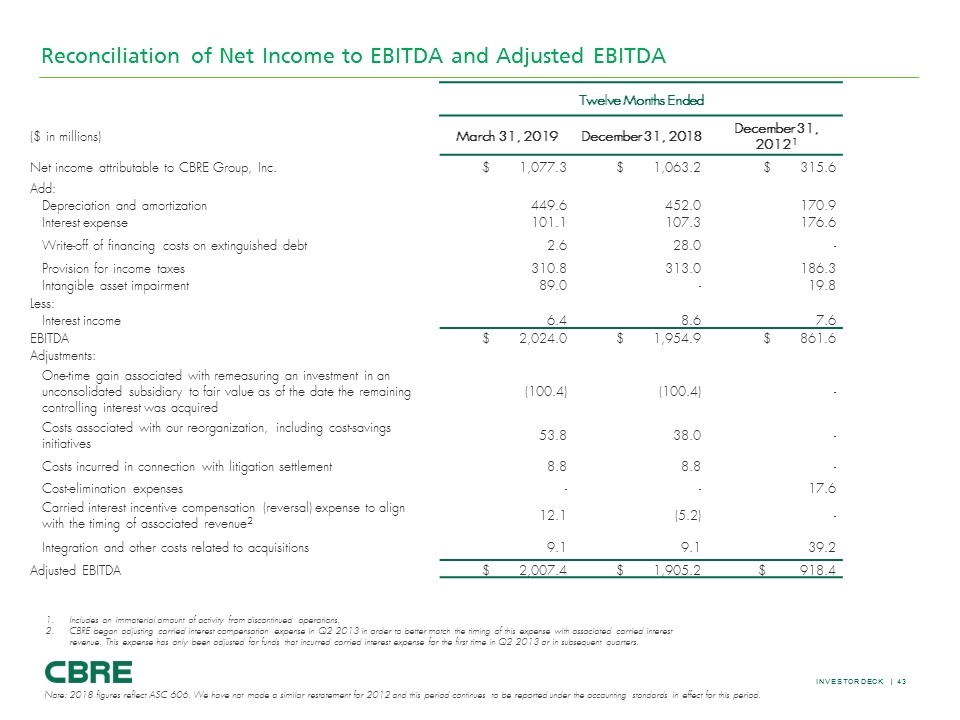
Twelve Months Ended ($ in millions) March 31, 2019 December 31, 2018 December 31, 20121 Net income attributable to CBRE Group, Inc. $ 1,077.3 $ 1,063.2 $ 315.6 Add: Depreciation and amortization 449.6 452.0 170.9 Interest expense 101.1 107.3 176.6 Write-off of financing costs on extinguished debt 2.6 28.0 - Provision for income taxes 310.8 313.0 186.3 Intangible asset impairment 89.0 - 19.8 Less: Interest income 6.4 8.6 7.6 EBITDA $ 2,024.0 $ 1,954.9 $ 861.6 Adjustments: One-time gain associated with remeasuring an investment in an unconsolidated subsidiary to fair value as of the date the remaining controlling interest was acquired (100.4) (100.4) - Costs associated with our reorganization, including cost-savings initiatives 53.8 38.0 - Costs incurred in connection with litigation settlement 8.8 8.8 - Cost-elimination expenses - - 17.6 Carried interest incentive compensation (reversal) expense to align with the timing of associated revenue2 12.1 (5.2) - Integration and other costs related to acquisitions 9.1 9.1 39.2 Adjusted EBITDA $ 2,007.4 $ 1,905.2 $ 918.4 Reconciliation of Net Income to EBITDA and Adjusted EBITDA Includes an immaterial amount of activity from discontinued operations. CBRE began adjusting carried interest compensation expense in Q2 2013 in order to better match the timing of this expense with associated carried interest revenue. This expense has only been adjusted for funds that incurred carried interest expense for the first time in Q2 2013 or in subsequent quarters. Note: 2018 figures reflect ASC 606. We have not made a similar restatement for 2012 and this period continues to be reported under the accounting standards in effect for this period.
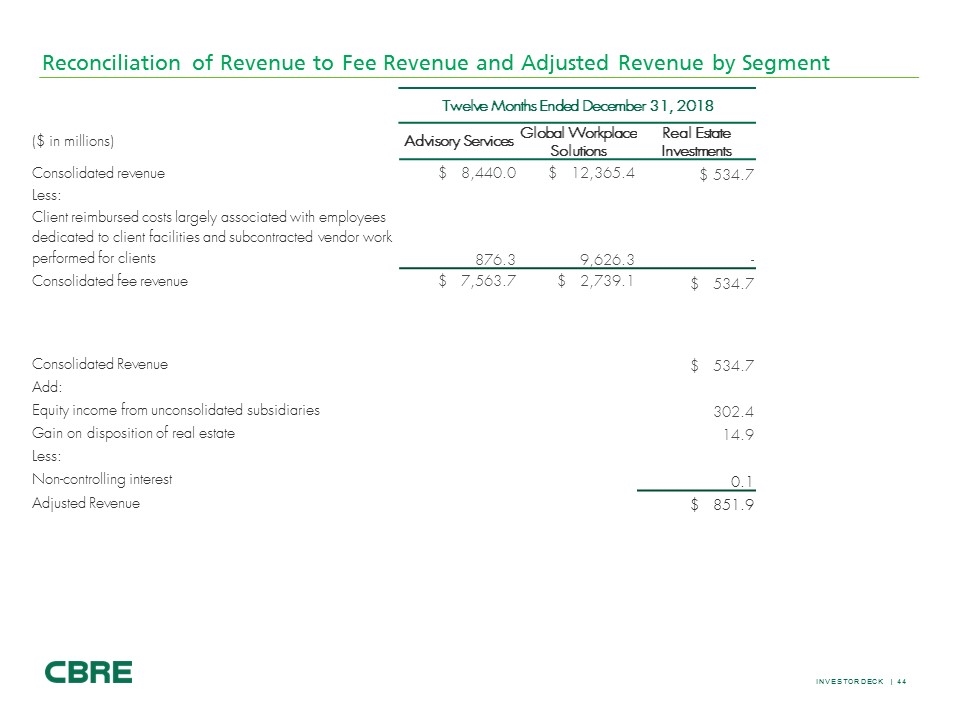
Twelve Months Ended December 31, 2018 ($ in millions) Advisory Services Global Workplace Solutions Real Estate Investments Consolidated revenue $ 8,440.0 $ 12,365.4 $ 534.7 Less: Client reimbursed costs largely associated with employees dedicated to client facilities and subcontracted vendor work performed for clients 876.3 9,626.3 - Consolidated fee revenue $ 7,563.7 $ 2,739.1 $ 534.7 Consolidated Revenue $ 534.7 Add: Equity income from unconsolidated subsidiaries 302.4 Gain on disposition of real estate 14.9 Less: Non-controlling interest 0.1 Adjusted Revenue $ 851.9 Reconciliation of Revenue to Fee Revenue and Adjusted Revenue by Segment
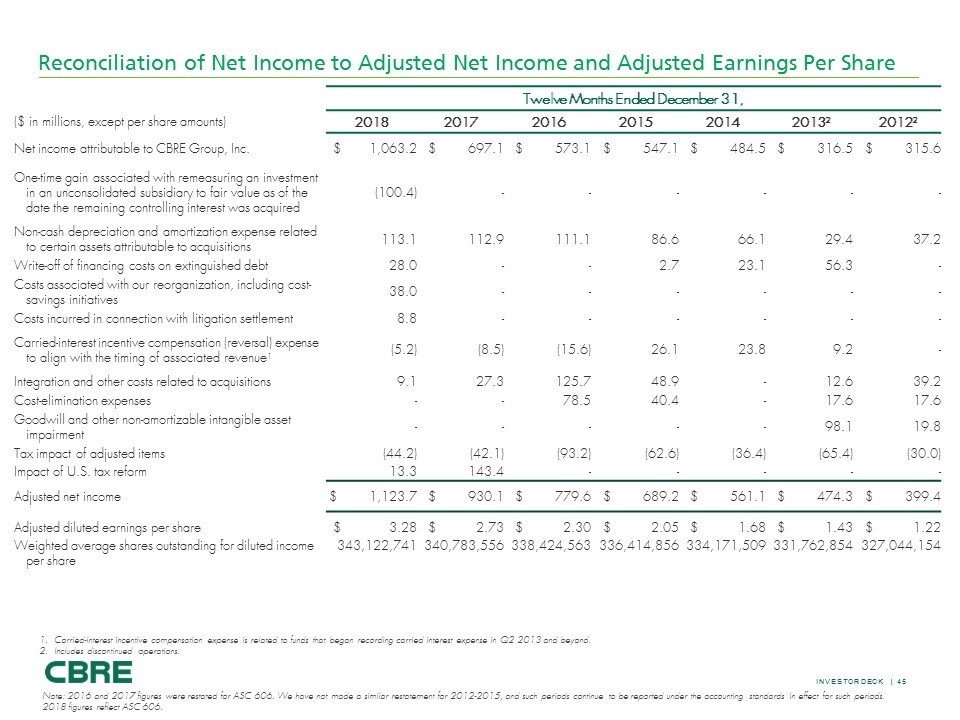
Reconciliation of Net Income to Adjusted Net Income and Adjusted Earnings Per Share Twelve Months Ended December 31, ($ in millions, except per share amounts) 2018 2017 2016 2015 2014 20132 20122 Net income attributable to CBRE Group, Inc. $ 1,063.2 $ 697.1 $ 573.1 $ 547.1 $ 484.5 $ 316.5 $ 315.6 One-time gain associated with remeasuring an investment in an unconsolidated subsidiary to fair value as of the date the remaining controlling interest was acquired (100.4) - - - - - - Non-cash depreciation and amortization expense related to certain assets attributable to acquisitions 113.1 112.9 111.1 86.6 66.1 29.4 37.2 Write-off of financing costs on extinguished debt 28.0 - - 2.7 23.1 56.3 - Costs associated with our reorganization, including cost-savings initiatives 38.0 - - - - - - Costs incurred in connection with litigation settlement 8.8 - - - - - - Carried-interest incentive compensation (reversal) expense to align with the timing of associated revenue1 (5.2) (8.5) (15.6) 26.1 23.8 9.2 - Integration and other costs related to acquisitions 9.1 27.3 125.7 48.9 - 12.6 39.2 Cost-elimination expenses - - 78.5 40.4 - 17.6 17.6 Goodwill and other non-amortizable intangible asset impairment - - - - - 98.1 19.8 Tax impact of adjusted items (44.2) (42.1) (93.2) (62.6) (36.4) (65.4) (30.0) Impact of U.S. tax reform 13.3 143.4 - - - - - Adjusted net income $ 1,123.7 $ 930.1 $ 779.6 $ 689.2 $ 561.1 $ 474.3 $ 399.4 Adjusted diluted earnings per share $ 3.28 $ 2.73 $ 2.30 $ 2.05 $ 1.68 $ 1.43 $ 1.22 Weighted average shares outstanding for diluted income per share 343,122,741 340,783,556 338,424,563 336,414,856 334,171,509 331,762,854 327,044,154 Carried-interest incentive compensation expense is related to funds that began recording carried interest expense in Q2 2013 and beyond. Includes discontinued operations. Note: 2016 and 2017 figures were restated for ASC 606. We have not made a similar restatement for 2012-2015, and such periods continue to be reported under the accounting standards in effect for such periods. 2018 figures reflect ASC 606.
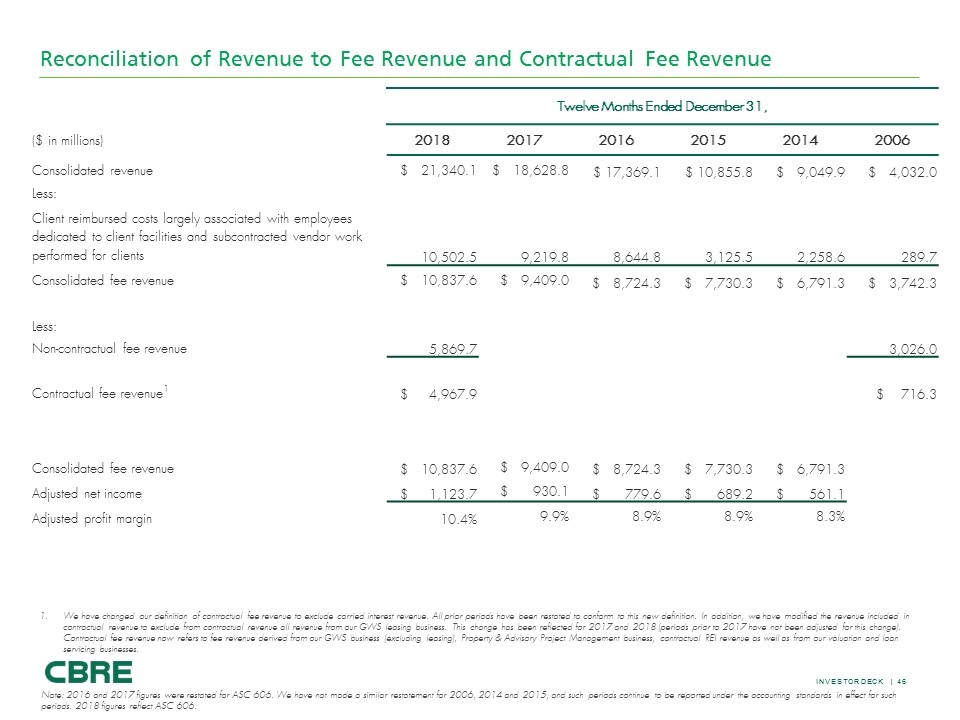
Twelve Months Ended December 31, ($ in millions) 2018 2017 2016 2015 2014 2006 Consolidated revenue $ 21,340.1 $ 18,628.8 $ 17,369.1 $ 10,855.8 $ 9,049.9 $ 4,032.0 Less: Client reimbursed costs largely associated with employees dedicated to client facilities and subcontracted vendor work performed for clients 10,502.5 9,219.8 8,644.8 3,125.5 2,258.6 289.7 Consolidated fee revenue $ 10,837.6 $ 9,409.0 $ 8,724.3 $ 7,730.3 $ 6,791.3 $ 3,742.3 Less: Non-contractual fee revenue 5,869.7 3,026.0 Contractual fee revenue1 $ 4,967.9 $ 716.3 Consolidated fee revenue $ 10,837.6 $ 9,409.0 $ 8,724.3 $ 7,730.3 $ 6,791.3 Adjusted net income $ 1,123.7 $ 930.1 $ 779.6 $ 689.2 $ 561.1 Adjusted profit margin 10.4% 9.9% 8.9% 8.9% 8.3% Reconciliation of Revenue to Fee Revenue and Contractual Fee Revenue Note: 2016 and 2017 figures were restated for ASC 606. We have not made a similar restatement for 2006, 2014 and 2015, and such periods continue to be reported under the accounting standards in effect for such periods. 2018 figures reflect ASC 606. We have changed our definition of contractual fee revenue to exclude carried interest revenue. All prior periods have been restated to conform to this new definition. In addition, we have modified the revenue included in contractual revenue to exclude from contractual revenue all revenue from our GWS leasing business. This change has been reflected for 2017 and 2018 (periods prior to 2017 have not been adjusted for this change). Contractual fee revenue now refers to fee revenue derived from our GWS business (excluding leasing), Property & Advisory Project Management business, contractual REI revenue as well as from our valuation and loan servicing businesses.
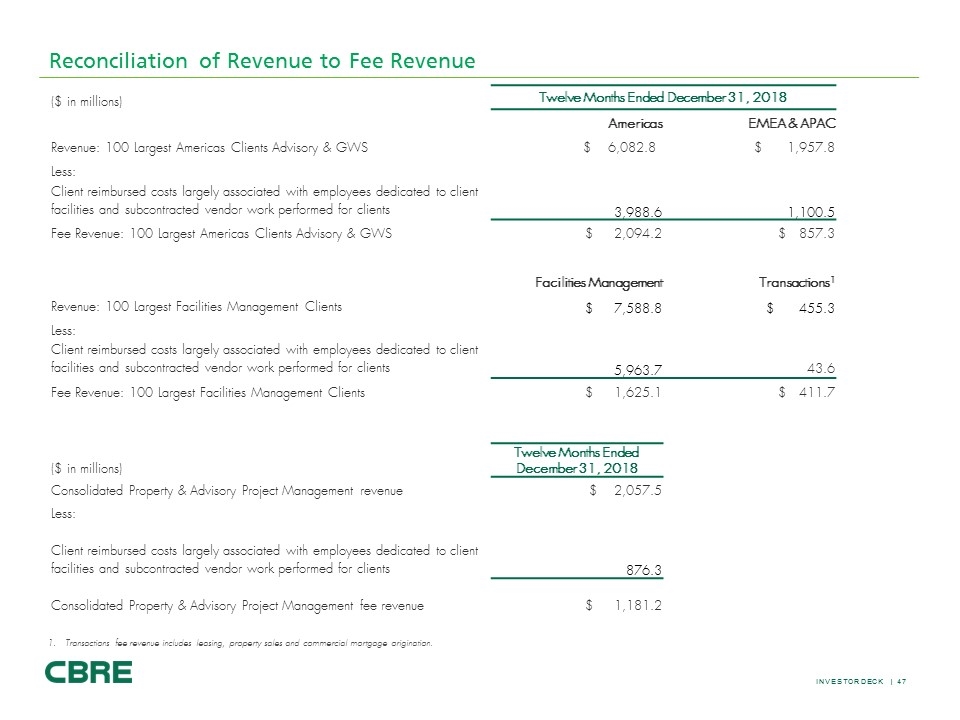
($ in millions) Twelve Months Ended December 31, 2018 Americas EMEA & APAC Revenue: 100 Largest Americas Clients Advisory & GWS $ 6,082.8 $ 1,957.8 Less: Client reimbursed costs largely associated with employees dedicated to client facilities and subcontracted vendor work performed for clients 3,988.6 1,100.5 Fee Revenue: 100 Largest Americas Clients Advisory & GWS $ 2,094.2 $ 857.3 Facilities Management Transactions1 Revenue: 100 Largest Facilities Management Clients $ 7,588.8 $ 455.3 Less: Client reimbursed costs largely associated with employees dedicated to client facilities and subcontracted vendor work performed for clients 5,963.7 43.6 Fee Revenue: 100 Largest Facilities Management Clients $ 1,625.1 $ 411.7 Reconciliation of Revenue to Fee Revenue Transactions fee revenue includes leasing, property sales and commercial mortgage origination. ($ in millions) Twelve Months Ended December 31, 2018 Consolidated Property & Advisory Project Management revenue $ 2,057.5 Less: Client reimbursed costs largely associated with employees dedicated to client facilities and subcontracted vendor work performed for clients 876.3 Consolidated Property & Advisory Project Management fee revenue $ 1,181.2
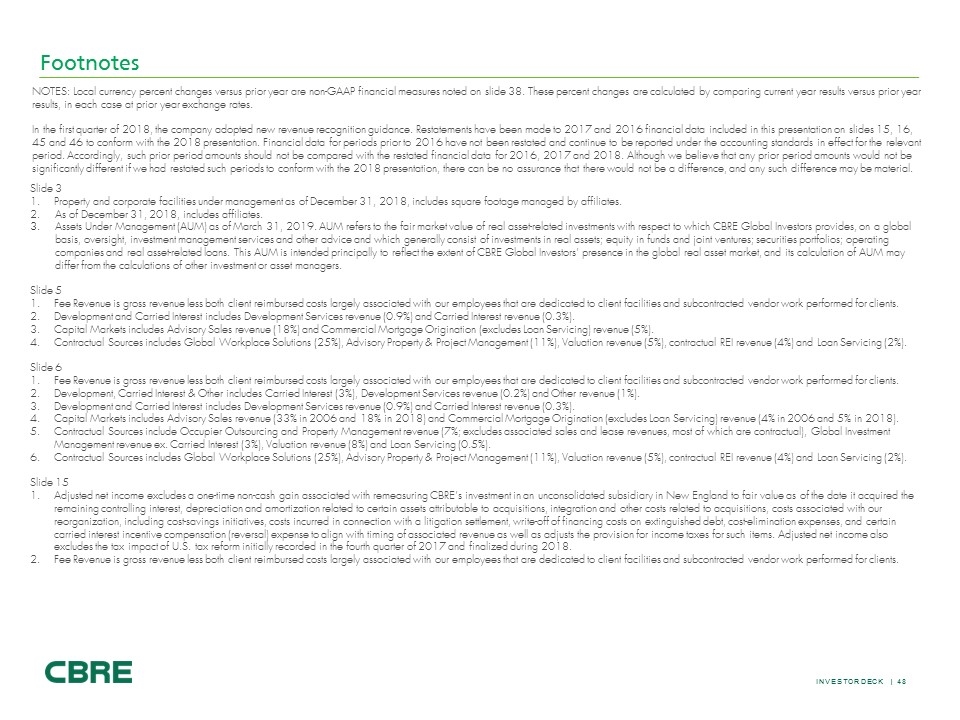
Footnotes NOTES: Local currency percent changes versus prior year are non-GAAP financial measures noted on slide 38. These percent changes are calculated by comparing current year results versus prior year results, in each case at prior year exchange rates. In the first quarter of 2018, the company adopted new revenue recognition guidance. Restatements have been made to 2017 and 2016 financial data included in this presentation on slides 15, 16, 45 and 46 to conform with the 2018 presentation. Financial data for periods prior to 2016 have not been restated and continue to be reported under the accounting standards in effect for the relevant period. Accordingly, such prior period amounts should not be compared with the restated financial data for 2016, 2017 and 2018. Although we believe that any prior period amounts would not be significantly different if we had restated such periods to conform with the 2018 presentation, there can be no assurance that there would not be a difference, and any such difference may be material. Slide 3 Property and corporate facilities under management as of December 31, 2018, includes square footage managed by affiliates. As of December 31, 2018, includes affiliates. Assets Under Management (AUM) as of March 31, 2019. AUM refers to the fair market value of real asset-related investments with respect to which CBRE Global Investors provides, on a global basis, oversight, investment management services and other advice and which generally consist of investments in real assets; equity in funds and joint ventures; securities portfolios; operating companies and real asset-related loans. This AUM is intended principally to reflect the extent of CBRE Global Investors’ presence in the global real asset market, and its calculation of AUM may differ from the calculations of other investment or asset managers. Slide 5 Fee Revenue is gross revenue less both client reimbursed costs largely associated with our employees that are dedicated to client facilities and subcontracted vendor work performed for clients. Development and Carried Interest includes Development Services revenue (0.9%) and Carried Interest revenue (0.3%). Capital Markets includes Advisory Sales revenue (18%) and Commercial Mortgage Origination (excludes Loan Servicing) revenue (5%). Contractual Sources includes Global Workplace Solutions (25%), Advisory Property & Project Management (11%), Valuation revenue (5%), contractual REI revenue (4%) and Loan Servicing (2%). Slide 6 Fee Revenue is gross revenue less both client reimbursed costs largely associated with our employees that are dedicated to client facilities and subcontracted vendor work performed for clients. Development, Carried Interest & Other includes Carried Interest (3%), Development Services revenue (0.2%) and Other revenue (1%). Development and Carried Interest includes Development Services revenue (0.9%) and Carried Interest revenue (0.3%). Capital Markets includes Advisory Sales revenue (33% in 2006 and 18% in 2018) and Commercial Mortgage Origination (excludes Loan Servicing) revenue (4% in 2006 and 5% in 2018). Contractual Sources include Occupier Outsourcing and Property Management revenue (7%; excludes associated sales and lease revenues, most of which are contractual), Global Investment Management revenue ex. Carried Interest (3%), Valuation revenue (8%) and Loan Servicing (0.5%). Contractual Sources includes Global Workplace Solutions (25%), Advisory Property & Project Management (11%), Valuation revenue (5%), contractual REI revenue (4%) and Loan Servicing (2%). Slide 15 Adjusted net income excludes a one-time non-cash gain associated with remeasuring CBRE’s investment in an unconsolidated subsidiary in New England to fair value as of the date it acquired the remaining controlling interest, depreciation and amortization related to certain assets attributable to acquisitions, integration and other costs related to acquisitions, costs associated with our reorganization, including cost-savings initiatives, costs incurred in connection with a litigation settlement, write-off of financing costs on extinguished debt, cost-elimination expenses, and certain carried interest incentive compensation (reversal) expense to align with timing of associated revenue as well as adjusts the provision for income taxes for such items. Adjusted net income also excludes the tax impact of U.S. tax reform initially recorded in the fourth quarter of 2017 and finalized during 2018. Fee Revenue is gross revenue less both client reimbursed costs largely associated with our employees that are dedicated to client facilities and subcontracted vendor work performed for clients.
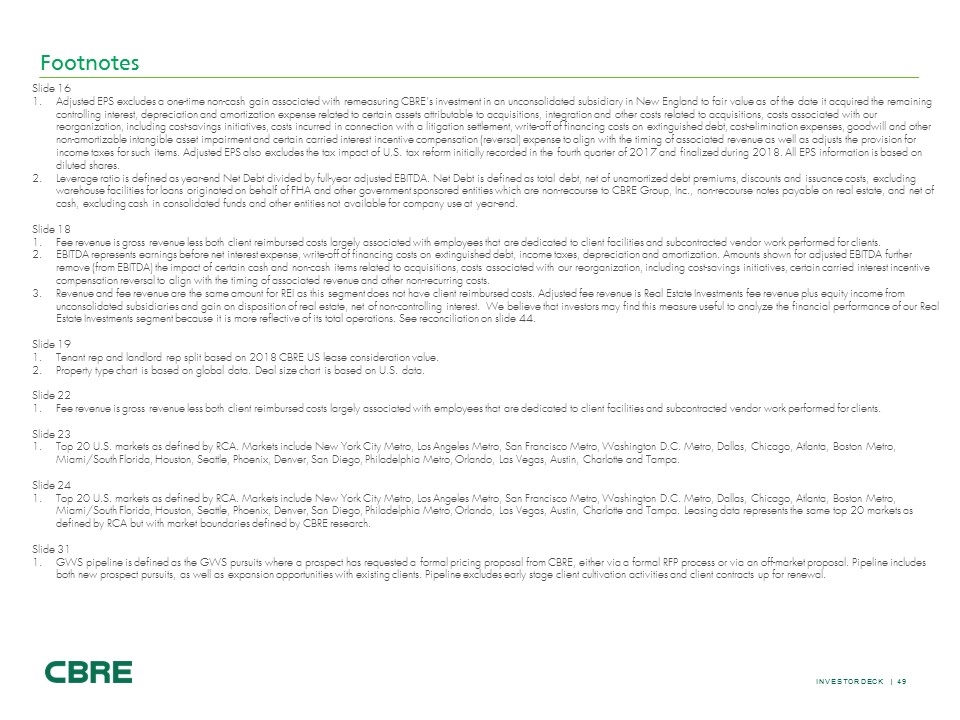
Footnotes Slide 16 Adjusted EPS excludes a one-time non-cash gain associated with remeasuring CBRE’s investment in an unconsolidated subsidiary in New England to fair value as of the date it acquired the remaining controlling interest, depreciation and amortization expense related to certain assets attributable to acquisitions, integration and other costs related to acquisitions, costs associated with our reorganization, including cost-savings initiatives, costs incurred in connection with a litigation settlement, write-off of financing costs on extinguished debt, cost-elimination expenses, goodwill and other non-amortizable intangible asset impairment and certain carried interest incentive compensation (reversal) expense to align with the timing of associated revenue as well as adjusts the provision for income taxes for such items. Adjusted EPS also excludes the tax impact of U.S. tax reform initially recorded in the fourth quarter of 2017 and finalized during 2018. All EPS information is based on diluted shares. Leverage ratio is defined as year-end Net Debt divided by full-year adjusted EBITDA. Net Debt is defined as total debt, net of unamortized debt premiums, discounts and issuance costs, excluding warehouse facilities for loans originated on behalf of FHA and other government sponsored entities which are non-recourse to CBRE Group, Inc., non-recourse notes payable on real estate, and net of cash, excluding cash in consolidated funds and other entities not available for company use at year-end. Slide 18 Fee revenue is gross revenue less both client reimbursed costs largely associated with employees that are dedicated to client facilities and subcontracted vendor work performed for clients. EBITDA represents earnings before net interest expense, write-off of financing costs on extinguished debt, income taxes, depreciation and amortization. Amounts shown for adjusted EBITDA further remove (from EBITDA) the impact of certain cash and non-cash items related to acquisitions, costs associated with our reorganization, including cost-savings initiatives, certain carried interest incentive compensation reversal to align with the timing of associated revenue and other non-recurring costs. Revenue and fee revenue are the same amount for REI as this segment does not have client reimbursed costs. Adjusted fee revenue is Real Estate Investments fee revenue plus equity income from unconsolidated subsidiaries and gain on disposition of real estate, net of non-controlling interest. We believe that investors may find this measure useful to analyze the financial performance of our Real Estate Investments segment because it is more reflective of its total operations. See reconciliation on slide 44. Slide 19 Tenant rep and landlord rep split based on 2018 CBRE US lease consideration value. Property type chart is based on global data. Deal size chart is based on U.S. data. Slide 22 Fee revenue is gross revenue less both client reimbursed costs largely associated with employees that are dedicated to client facilities and subcontracted vendor work performed for clients. Slide 23 Top 20 U.S. markets as defined by RCA. Markets include New York City Metro, Los Angeles Metro, San Francisco Metro, Washington D.C. Metro, Dallas, Chicago, Atlanta, Boston Metro, Miami/South Florida, Houston, Seattle, Phoenix, Denver, San Diego, Philadelphia Metro, Orlando, Las Vegas, Austin, Charlotte and Tampa. Slide 24 Top 20 U.S. markets as defined by RCA. Markets include New York City Metro, Los Angeles Metro, San Francisco Metro, Washington D.C. Metro, Dallas, Chicago, Atlanta, Boston Metro, Miami/South Florida, Houston, Seattle, Phoenix, Denver, San Diego, Philadelphia Metro, Orlando, Las Vegas, Austin, Charlotte and Tampa. Leasing data represents the same top 20 markets as defined by RCA but with market boundaries defined by CBRE research. Slide 31 GWS pipeline is defined as the GWS pursuits where a prospect has requested a formal pricing proposal from CBRE, either via a formal RFP process or via an off-market proposal. Pipeline includes both new prospect pursuits, as well as expansion opportunities with existing clients. Pipeline excludes early stage client cultivation activities and client contracts up for renewal.
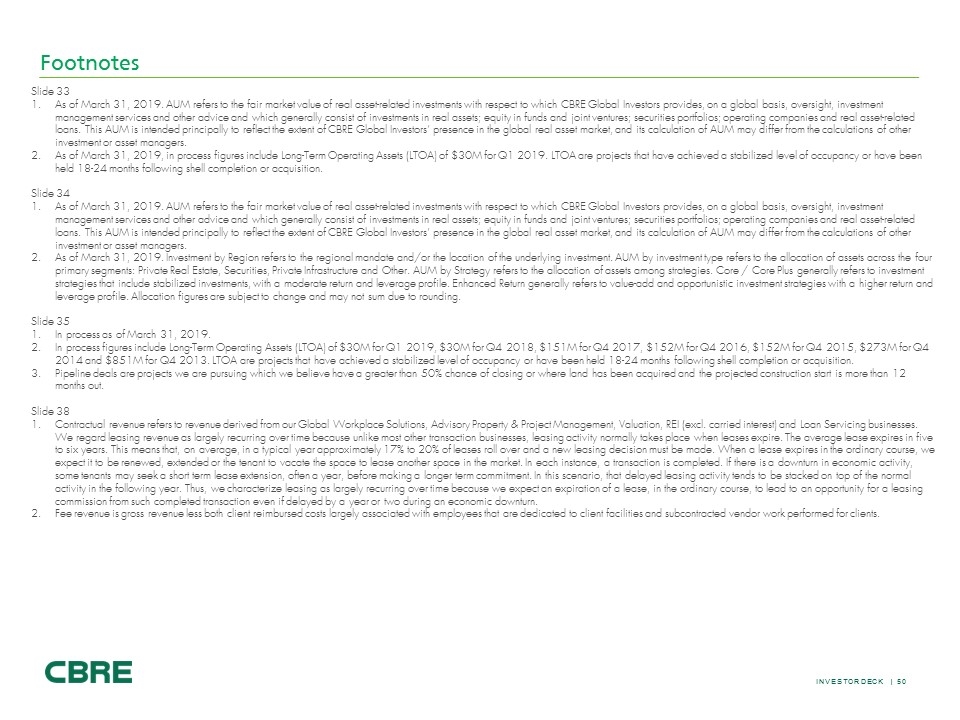
Slide 33 As of March 31, 2019. AUM refers to the fair market value of real asset-related investments with respect to which CBRE Global Investors provides, on a global basis, oversight, investment management services and other advice and which generally consist of investments in real assets; equity in funds and joint ventures; securities portfolios; operating companies and real asset-related loans. This AUM is intended principally to reflect the extent of CBRE Global Investors’ presence in the global real asset market, and its calculation of AUM may differ from the calculations of other investment or asset managers. As of March 31, 2019, in process figures include Long-Term Operating Assets (LTOA) of $30M for Q1 2019. LTOA are projects that have achieved a stabilized level of occupancy or have been held 18-24 months following shell completion or acquisition. Slide 34 As of March 31, 2019. AUM refers to the fair market value of real asset-related investments with respect to which CBRE Global Investors provides, on a global basis, oversight, investment management services and other advice and which generally consist of investments in real assets; equity in funds and joint ventures; securities portfolios; operating companies and real asset-related loans. This AUM is intended principally to reflect the extent of CBRE Global Investors’ presence in the global real asset market, and its calculation of AUM may differ from the calculations of other investment or asset managers. As of March 31, 2019. Investment by Region refers to the regional mandate and/or the location of the underlying investment. AUM by investment type refers to the allocation of assets across the four primary segments: Private Real Estate, Securities, Private Infrastructure and Other. AUM by Strategy refers to the allocation of assets among strategies. Core / Core Plus generally refers to investment strategies that include stabilized investments, with a moderate return and leverage profile. Enhanced Return generally refers to value-add and opportunistic investment strategies with a higher return and leverage profile. Allocation figures are subject to change and may not sum due to rounding. Slide 35 In process as of March 31, 2019. In process figures include Long-Term Operating Assets (LTOA) of $30M for Q1 2019, $30M for Q4 2018, $151M for Q4 2017, $152M for Q4 2016, $152M for Q4 2015, $273M for Q4 2014 and $851M for Q4 2013. LTOA are projects that have achieved a stabilized level of occupancy or have been held 18-24 months following shell completion or acquisition. Pipeline deals are projects we are pursuing which we believe have a greater than 50% chance of closing or where land has been acquired and the projected construction start is more than 12 months out. Slide 38 Contractual revenue refers to revenue derived from our Global Workplace Solutions, Advisory Property & Project Management, Valuation, REI (excl. carried interest) and Loan Servicing businesses. We regard leasing revenue as largely recurring over time because unlike most other transaction businesses, leasing activity normally takes place when leases expire. The average lease expires in five to six years. This means that, on average, in a typical year approximately 17% to 20% of leases roll over and a new leasing decision must be made. When a lease expires in the ordinary course, we expect it to be renewed, extended or the tenant to vacate the space to lease another space in the market. In each instance, a transaction is completed. If there is a downturn in economic activity, some tenants may seek a short term lease extension, often a year, before making a longer term commitment. In this scenario, that delayed leasing activity tends to be stacked on top of the normal activity in the following year. Thus, we characterize leasing as largely recurring over time because we expect an expiration of a lease, in the ordinary course, to lead to an opportunity for a leasing commission from such completed transaction even if delayed by a year or two during an economic downturn. Fee revenue is gross revenue less both client reimbursed costs largely associated with employees that are dedicated to client facilities and subcontracted vendor work performed for clients. Footnotes
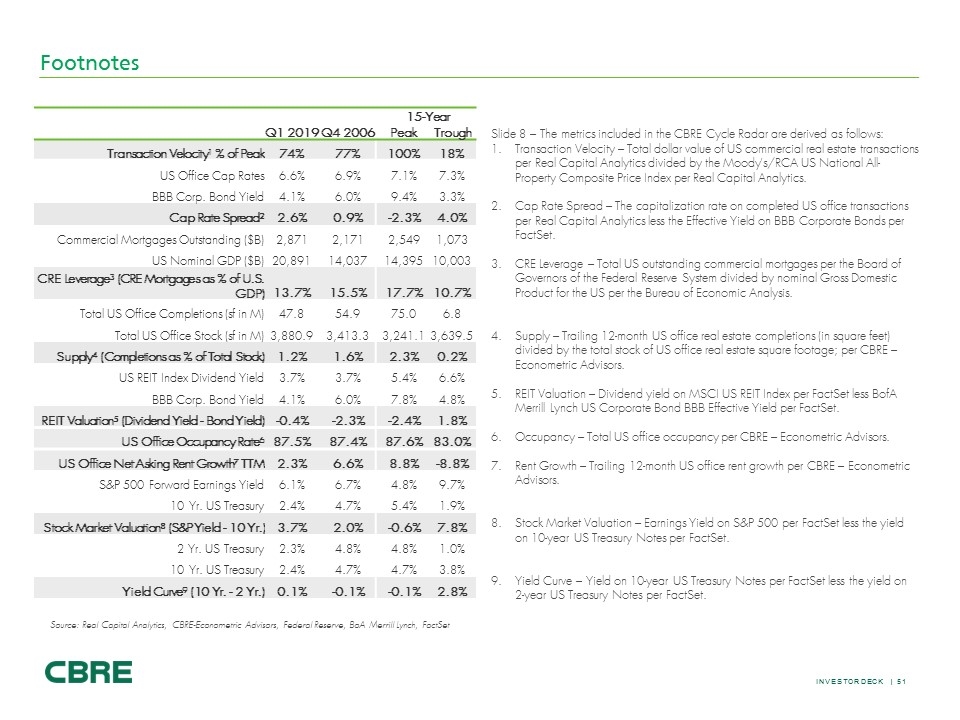
Footnotes Slide 8 – The metrics included in the CBRE Cycle Radar are derived as follows: Transaction Velocity – Total dollar value of US commercial real estate transactions per Real Capital Analytics divided by the Moody’s/RCA US National All-Property Composite Price Index per Real Capital Analytics. Cap Rate Spread – The capitalization rate on completed US office transactions per Real Capital Analytics less the Effective Yield on BBB Corporate Bonds per FactSet. CRE Leverage – Total US outstanding commercial mortgages per the Board of Governors of the Federal Reserve System divided by nominal Gross Domestic Product for the US per the Bureau of Economic Analysis. Supply – Trailing 12-month US office real estate completions (in square feet) divided by the total stock of US office real estate square footage; per CBRE – Econometric Advisors. REIT Valuation – Dividend yield on MSCI US REIT Index per FactSet less BofA Merrill Lynch US Corporate Bond BBB Effective Yield per FactSet. Occupancy – Total US office occupancy per CBRE – Econometric Advisors. Rent Growth – Trailing 12-month US office rent growth per CBRE – Econometric Advisors. Stock Market Valuation – Earnings Yield on S&P 500 per FactSet less the yield on 10-year US Treasury Notes per FactSet. Yield Curve – Yield on 10-year US Treasury Notes per FactSet less the yield on 2-year US Treasury Notes per FactSet. Source: Real Capital Analytics, CBRE-Econometric Advisors, Federal Reserve, BoA Merrill Lynch, FactSet 15-Year Q1 2019 Q4 2006 Peak Trough Transaction Velocity1 % of Peak 74% 77% 100% 18% US Office Cap Rates 6.6% 6.9% 7.1% 7.3% BBB Corp. Bond Yield 4.1% 6.0% 9.4% 3.3% Cap Rate Spread2 2.6% 0.9% -2.3% 4.0% Commercial Mortgages Outstanding ($B) 2,871 2,171 2,549 1,073 US Nominal GDP ($B) 20,891 14,037 14,395 10,003 CRE Leverage3 (CRE Mortgages as % of U.S. GDP) 13.7% 15.5% 17.7% 10.7% Total US Office Completions (sf in M) 47.8 54.9 75.0 6.8 Total US Office Stock (sf in M) 3,880.9 3,413.3 3,241.1 3,639.5 Supply4 (Completions as % of Total Stock) 1.2% 1.6% 2.3% 0.2% US REIT Index Dividend Yield 3.7% 3.7% 5.4% 6.6% BBB Corp. Bond Yield 4.1% 6.0% 7.8% 4.8% REIT Valuation5 (Dividend Yield - Bond Yield) -0.4% -2.3% -2.4% 1.8% US Office Occupancy Rate6 87.5% 87.4% 87.6% 83.0% US Office Net Asking Rent Growth7 TTM 2.3% 6.6% 8.8% -8.8% S&P 500 Forward Earnings Yield 6.1% 6.7% 4.8% 9.7% 10 Yr. US Treasury 2.4% 4.7% 5.4% 1.9% Stock Market Valuation8 (S&P Yield - 10 Yr.) 3.7% 2.0% -0.6% 7.8% 2 Yr. US Treasury 2.3% 4.8% 4.8% 1.0% 10 Yr. US Treasury 2.4% 4.7% 4.7% 3.8% Yield Curve9 (10 Yr. - 2 Yr.) 0.1% -0.1% -0.1% 2.8%